
Meet the 7th Warden GHANA: Building the basics Inspiring People
The (Other) Idea of a University


Meet the 7th Warden GHANA: Building the basics Inspiring People
The (Other) Idea of a University
to this 'new-look' Trinitytoday, the first of three editions planned for 2007 — in May, September and December. By publishing more frequently we hope to be better able to keep you up-todate with all that is happening at Trinity. Supplementary material is also available online wherever you see this symbol:
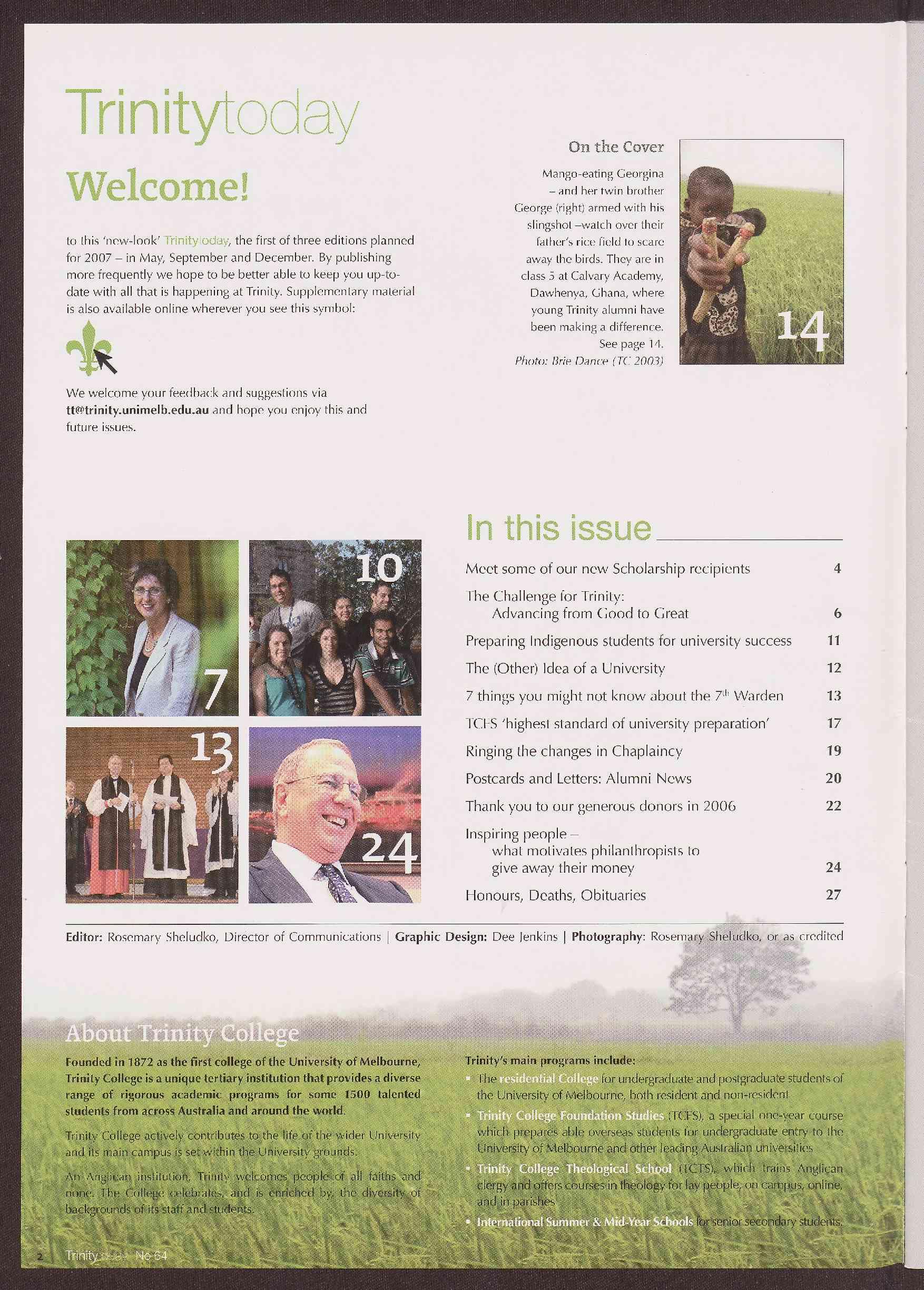
We welcome your feedback and suggestions via tt@trinity.unimelb.edu.au and hope you enjoy this and future issues.
Founded in 1872 as the first college of the University of Melbourne, Trinity College is a unique tertiary institution that provides a diverse range of rigorous academic programs for some 1500 talented students from across Australia and
Trinity College actively contributes to the life of the wider University and its main campus is set within the University grounds.
An Anglican institution, Trinity welcomes people of all faiths and none. The College c lebrates, and is enriched by, the diversity of backgrounds of its staff and students.
the Cover
Mango-eating Georgina — and her twin brother George (right) armed with his slingshot —watch over their father's rice field to scare away the birds. They are in class 5 at Calvary Academy, Dawhenya, Ghana, where young Trinity alumni have been making a difference. See page 14.
Trinity's main programs include: The for undergraduate and postgraduate students of the University of Melbourne, both resident and non-resident (TCFS), a special one-year course which prepares able overseas students for undergraduate entry to the University of Melbourne and other leading Australian universities (TCTS), which trains Anglican clergy and offers courses in theology for lay people, on campus, online, and in parishes for semer secondary student:
I, Andrew Brian McGowan, duly elected as Warden of Trinity College, promise to uphold the purposes for which the College was founded, as a place of learning and faith, in which the finest qualities are nurtured in a community of scholars; to hold in trust the rich inheritance received from those who have gone before; to hand it on faithfully to those who come after; and to exercise my authority as Warden justly, so that all who live and work and study here may flourish and excel,
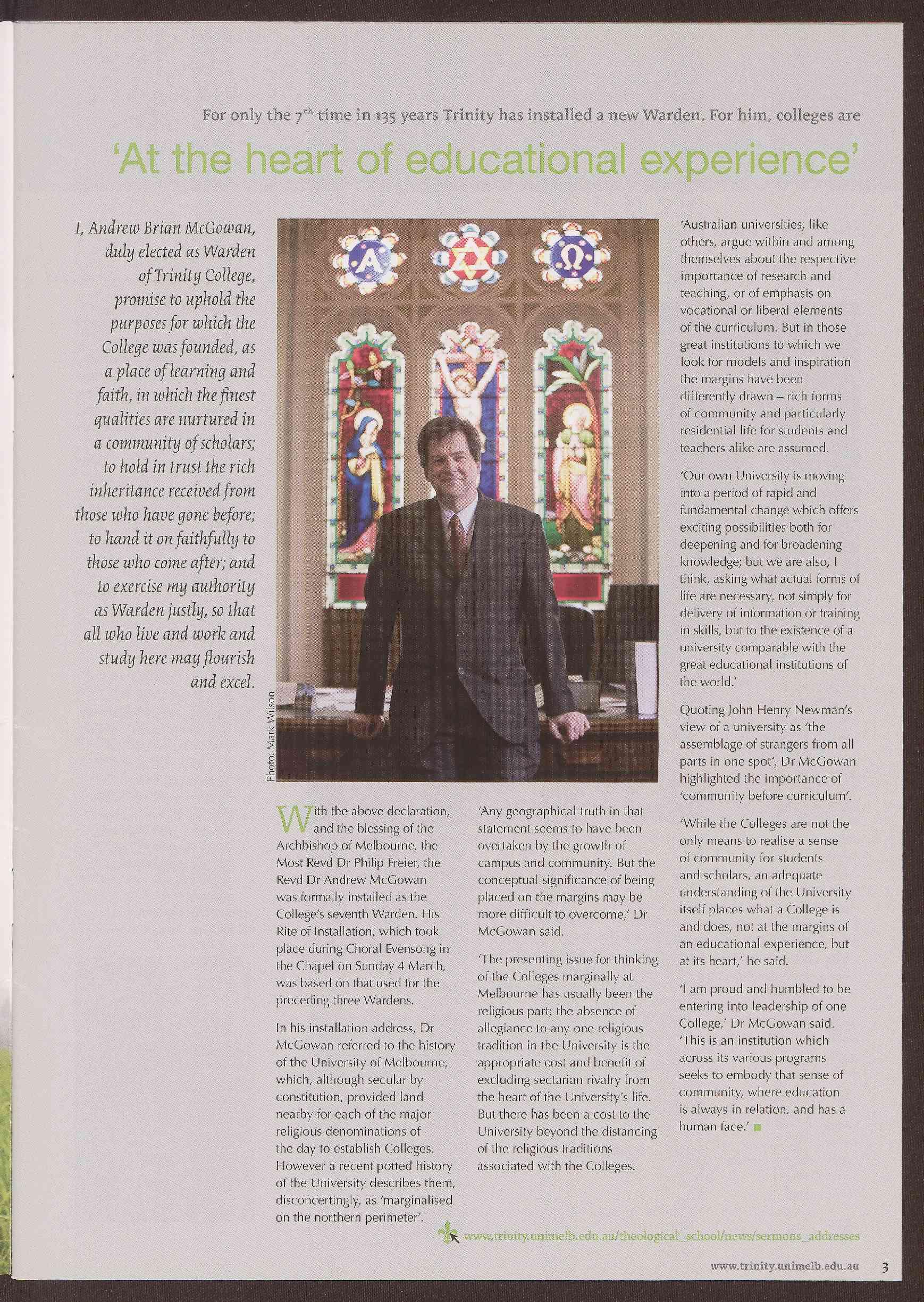
ith the above declaration, and the blessing of the Archbishop of Melbourne, the Most Revd Dr Philip Freier, the Revd Dr Andrew McGowan was formally installed as the College's seventh Warden. His Rite of Installation, which took place during Choral Evensong in the Chapel on Sunday 4 March, was based on that used for the preceding three Wardens.
In his installation address, Dr McGowan referred to the history of the University of Melbourne, which, although secular by constitution, provided land nearby for each of the major religious denominations of the day to establish Colleges. However a recent potted history of the University describes them, disconcertingly, as 'marginalised on the northern perimeter'.
'Any geographical truth in that statement seems to have been overtaken by the growth of campus and community. But the conceptual significance of being placed on the margins may be more difficult to overcome,' Dr McGowan said.
'The presenting issue for thinking of the Colleges marginally at Melbourne has usually been the religious part; the absence of allegiance to any one religious tradition in the University is the appropriate cost and benefit of excluding sectarian rivalry from the heart of the University's life. But there has been a cost to the University beyond the distancing of the religious traditions associated with the Colleges.
'Australian universities, like others, argue within and among themselves about the respective importance of research and teaching, or of emphasis on vocational or liberal elements of the curriculum. But in those great institutions to which we look for models and inspiration the margins have been differently drawn — rich forms of community and particularly residential life for students and teachers alike are assumed.
'Our own University is moving into a period of rapid and fundamental change which offers exciting possibilities both for deepening and for broadening knowledge; but we are also, I think, asking what actual forms of life are necessary, not simply for delivery of information or training in skills, but to the existence of a university comparable with the great educational institutions of the world.'
Quoting John Henry Newman's view of a university as 'the assemblage of strangers from all parts in one spot', Dr McGowan highlighted the importance of 'community before curriculum'.
'While the Colleges are not the only means to realise a sense of community for students and scholars, an adequate understanding of the University itself places what a College is and does, not at the margins of an educational experience, but at its heart,' he said.
'I am proud and humbled to be entering into leadership of one College,' Dr McGowan said. 'This is an institution which across its various programs seeks to embody that sense of community, where education is always in relation, and has a human face.'
Scholarships can transform the lives of their recipients by providing access to educational opportunities that would otherwise be financially unattainable. But they also enhance the calibre and diversity of the whole student body, thereby enriching the experience of all students..
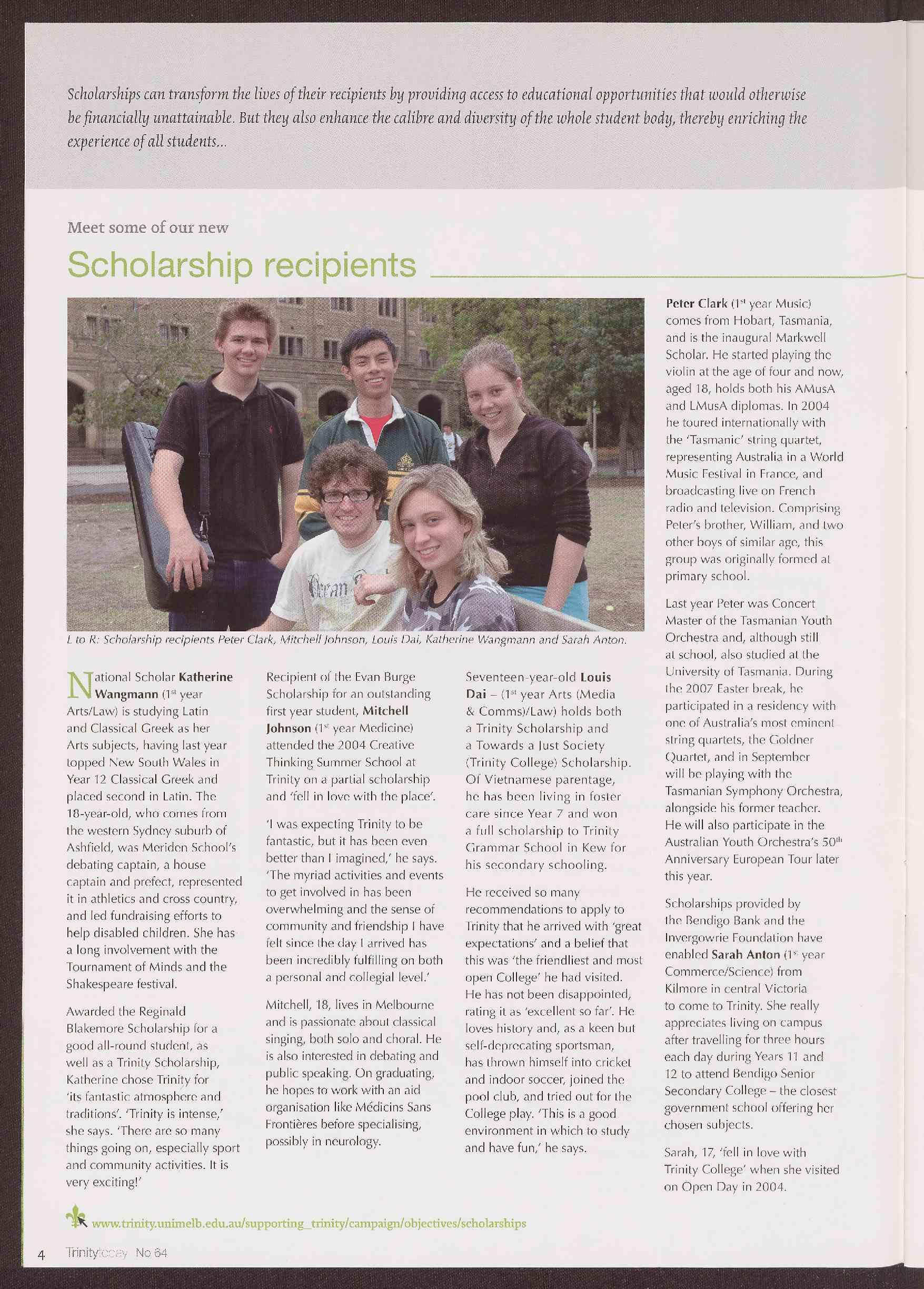
Meet some of our new
National Scholar Katherine Wangmann (1" year Arts/Law) is studying Latin and Classical Greek as her Arts subjects, having last year topped New South Wales in Year 12 Classical Greek and placed second in Latin. The 18-year-old, who comes from the western Sydney suburb of Ashfield, was Meriden School's debating captain, a house captain and prefect, represented it in athletics and cross country, and led fundraising efforts to help disabled children. She has a long involvement with the Tournament of Minds and the Shakespeare festival.
Awarded the Reginald Blakemore Scholarship for a good all-round student, as well as a Trinity Scholarship, Katherine chose Trinity for 'its fantastic atmosphere and traditions'. 'Trinity is intense,' she says. 'There are so many things going on, especially sport and community activities. It is very exciting!'
Recipient of the Evan Burge Scholarship for an outstanding first year student, Mitchell Johnson (1st year Medicine) attended the 2004 Creative Thinking Summer School at Trinity on a partial scholarship and 'fell in love with the place'.
'I was expecting Trinity to be fantastic, but it has been even better than I imagined,' he says.
'The myriad activities and events to get involved in has been overwhelming and the sense of community and friendship I have felt since the day I arrived has been incredibly fulfilling on both a personal and collegial level.'
Mitchell, 18, lives in Melbourne and is passionate about classical singing, both solo and choral. He is also interested in debating and public speaking. On graduating, he hopes to work with an aid organisation like Médicins Sans Frontières before specialising, possibly in neurology.
Seventeen-year-old Louis Dai — (1st year Arts (Media & Comms)/Law) holds both a Trinity Scholarship and a Towards a Just Society (Trinity College) Scholarship. Of Vietnamese parentage, he has been living in foster care since Year 7 and won a full scholarship to Trinity Grammar School in Kew for his secondary schooling.
He received so many recommendations to apply to Trinity that he arrived with 'great expectations' and a belief that this was 'the friendliest and most open College' he had visited. He has not been disappointed, rating it as 'excellent so far'. He loves history and, as a keen but self-deprecating sportsman, has thrown himself into cricket and indoor soccer, joined the pool club, and tried out for the College play. 'This is a good environment in which to study and have fun,' he says.
Peter Clark (1st year Music) comes from Hobart, Tasmania, and is the inaugural Markwell Scholar. He started playing the violin at the age of four and now, aged 18, holds both his AMusA and LMusA diplomas. In 2004 he toured internationally with the 'Tasmanic' string quartet, representing Australia in a World Music Festival in France, and broadcasting live on French radio and television. Comprising Peter's brother, William, and two other boys of similar age, this group was originally formed at primary school.
Last year Peter was Concert Master of the Tasmanian Youth Orchestra and, although still at school, also studied at the University of Tasmania. During the 2007 Easter break, he participated in a residency with one of Australia's most eminent string quartets, the Goldner Quartet, and in September will be playing with the Tasmanian Symphony Orchestra, alongside his former teacher. He will also participate in the Australian Youth Orchestra s 50th Anniversary European Tour later this year.
Scholarships provided by the Bendigo Bank and the Invergowrie Foundation have enabled Sarah Anton (1st year Commerce/Science) from Kilmore in central Victoria to come to Trinity. She really appreciates living on campus after travelling for three hours each day during Years 11 and 12 to attend Bendigo Senior Secondary College — the closest government school offering her chosen subjects.
Sarah, 17, 'fell in love with Trinity College' when she visited on Open Day in 2004.
...Trinity's vision is to build its capacity to become — like the top US colleges — a 'needs blind' institution, able to offer places to the best students regardless of their means. While the College is still a long way from reaching this goal, generous benefactors are enabling a number of scholars to contribute their diverse talents and backgrounds to the Trinity community.
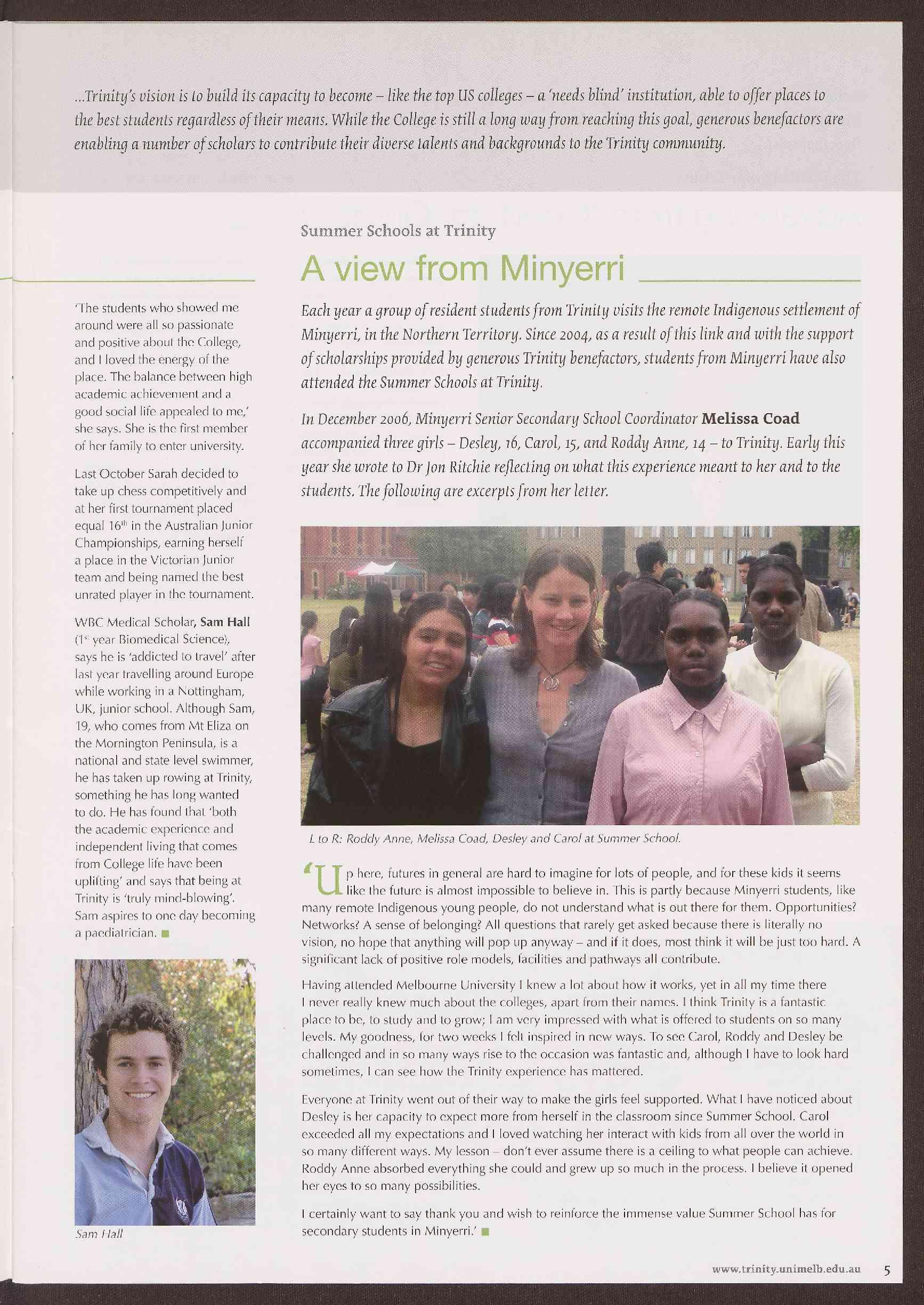
'The students who showed me around were all so passionate and positive about the College, and I loved the energy of the place. The balance between high academic achievement and a good social life appealed to me,' she says. She is the first member of her family to enter university.
Last October Sarah decided to take up chess competitively and at her first tournament placed equal 16th in the Australian Junior Championships, earning herself a place in the Victorian Junior team and being named the best unrated player in the tournament.
WBC Medical Scholar, Sam Hall (1st year Biomedical Science), says he is 'addicted to travel' after last year travelling around Europe while working in a Nottingham, UK, junior school. Although Sam, 19, who comes from Mt Eliza on the Mornington Peninsula, is a national and state level swimmer, he has taken up rowing at Trinity, something he has long wanted to do. He has found that 'both the academic experience and independent living that comes from College life have been uplifting' and says that being at Trinity is 'truly mind-blowing'. Sam aspires to one day becoming a paediatrician. ■
Each year a group of resident students from Trinity visits the remote Indigenous settlement of Minyerri, in the Northern Territory. Since 2004, as a result of this link and with the support of scholarships provided by generous Trinity benefactors, students from Minyerri have also attended the Summer Schools at Trinity.
In December 2006, Minyerri Senior Secondary School Coordinator Melissa Coad accompanied three girls— Desley, 16, Carol, 15, and Roddy Anne,14 — to Trinity, Early this year she wrote to Dr Jon Ritchie reflecting on what this experience meant to her and to the students. The following are excerpts from her letter.
L to R: Roddy Anne, Melissa Coad, Desley and Carol at Summer School.
tup here, futures in general are hard to imagine for lots of people, and for these kids it seems like the future is almost impossible to believe in. This is partly because Minyerri students, like many remote Indigenous young people, do not understand what is out there for them. Opportunities? Networks? A sense of belonging? All questions that rarely get asked because there is literally no vision, no hope that anything will pop up anyway — and if it does, most think it will be just too hard. A significant lack of positive role models, facilities and pathways all contribute.
Having attended Melbourne University I knew a lot about how it works, yet in all my time there I never really knew much about the colleges, apart from their names. I think Trinity is a fantastic place to be, to study and to grow; I am very impressed with what is offered to students on so many levels. My goodness, for two weeks I felt inspired in new ways. To see Carol, Roddy and Desley be challenged and in so many ways rise to the occasion was fantastic and, although I have to look hard sometimes, I can see how the Trinity experience has mattered.
Everyone at Trinity went out of their way to make the girls feel supported. What I have noticed about Desley is her capacity to expect more from herself in the classroom since Summer School. Carol exceeded all my expectations and I loved watching her interact with kids from all over the world in so many different ways. My lesson — don't ever assume there is a ceiling to what people can achieve. Roddy Anne absorbed everything she could and grew up so much in the process. I believe it opened her eyes to so many possibilities.
I certainly want to say thank you and wish to reinforce the immense value Summer School has for secondary students in Minyerri.' ■
At the dinner following the Installation of the seventh Warden, the Chairman of the Board — and son of the third Warden — Mr Bill Cowan proposed a toast to 'the College and its future under Andrew's leadership', The following is an edited excerpt from that toast,
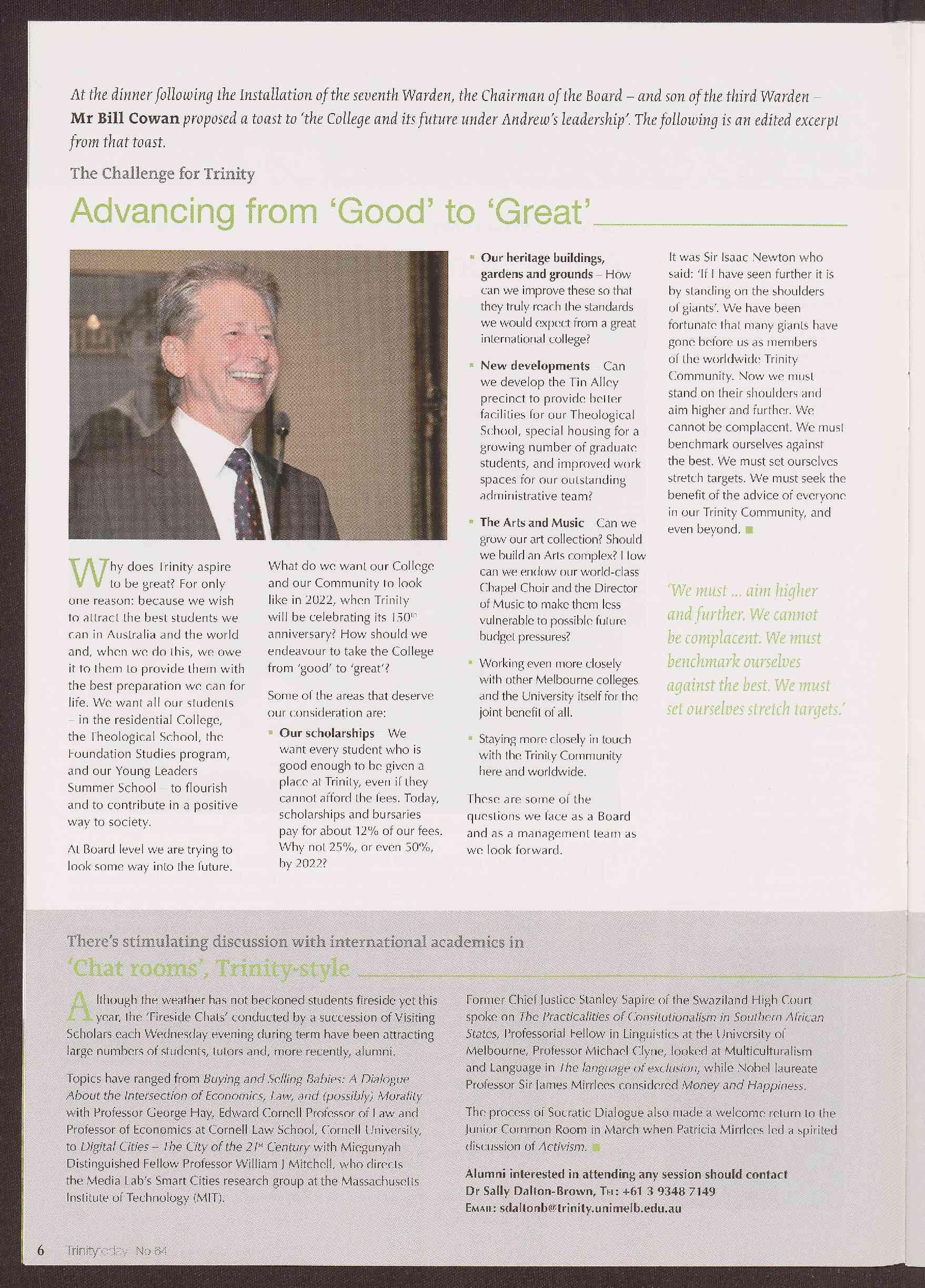
• Our heritage buildings, gardens and grounds — How can we improve these so that they truly reach the standards we would expect from a great international college?
New developments — Can we develop the Tin Alley precinct to provide better facilities for our Theological School, special housing for a growing number of graduate students, and improved work spaces for our outstanding administrative team?
by does Trinity aspire to be great? For only one reason: because we wish to attract the best students we can in Australia and the world and, when we do this, we owe it to them to provide them with the best preparation we can for life. We want all our students — in the residential College, the Theological School, the Foundation Studies program, and our Young Leaders Summer School — to flourish and to contribute in a positive way to society.
At Board level we are trying to look some way into the future.
What do we want our College and our Community to look like in 2022, when Trinity will be celebrating its 150'h anniversary? How should we endeavour to take the College from 'good' to 'great'?
Some of the areas that deserve our consideration are:
■ Our scholarships — We want every student who is good enough to be given a place at Trinity, even if they cannot afford the fees. Today, scholarships and bursaries pay for about 12% of our fees. Why not 25%, or even 50%, by 2022?
• The Arts and Music — Can we grow our art collection? Should we build an Arts complex? How can we endow our world-class Chapel Choir and the Director of Music to make them less vulnerable to possible future budget pressures?
• Working even more closely with other Melbourne colleges and the University itself for the joint benefit of all.
• Staying more closely in touch with the Trinity Community here and worldwide.
These are some of the questions we face as a Board and as a management team as we look forward.
It was Sir Isaac Newton who said: 'If I have seen further it is by standing on the shoulders of giants'. We have been fortunate that many giants have gone before us as members of the worldwide Trinity Community. Now we must stand on their shoulders and aim higher and further. We cannot be complacent. We must benchmark ourselves against the best. We must set ourselves stretch targets. We must seek the benefit of the advice of everyone in our Trinity Community, and even beyond.
'We must ,., aim higher and further. We cannot be complacent. We must benchmark ourselves against the best. We must set ourselves stretch targets,'
(though the weather has not beckoned students fireside yet this year, the 'Fireside Chats' conducted by a succession of Visiting Scholars each Wednesday evening during term have been attracting large numbers of students, tutors and, more recently, alumni.
Topics have ranged from Buying and Selling Babies: A Dialogue About the Intersection of Economics, Law, and (possibly) Morality with Professor George Hay, Edward Cornell Professor of Law and Professor of Economics at Cornell Law School, Cornell University, to Digital Cities — The City of the 21" Century with Miegunyah Distinguished Fellow Professor William J Mitchell, who directs the Media Lab's Smart Cities research group at the Massachusetts Institute of Technology (MIT).
Former Chief Justice Stanley Sapire of the Swaziland High Court spoke on The Practicalities of Consitutionalism in Southern African States, Professorial Fellow in Linguistics at the University of Melbourne, Professor Michael Clyne, looked at Multiculturalism and Language in The language of exclusion, while Nobel laureate Professor Sir James Mirrlees considered Money and Happiness.
The process of Socratic Dialogue also made a welcome return to the Junior Common Room in March when Patricia Mirrlees led a spirited discussion of Activism.
Alumni interested in attending any session should contact Dr Sally Dalton-Brown, TEL: +61 3 9348 7149
EMAIL: sdaltonb@trinity.unimelb.edu.au
With Clare at the helm, total fundraising has increased i000% over the last nine years, and Annual Giving has risen ten fold in ten years,
Clare Pullar, Director of Development and Executive Officer of the Trinity College Foundation since 1997, will shortly take up a new role as Director of Advancement at the Melbourne Business School (MBS).
'Naturally we received Clare's news with mixed feelings,' the Warden, Dr Andrew McGowan, said. 'The College owes Clare a great debt of gratitude for her leadership of Trinity's highly successful ventures in educational philanthropy, and we extend our very best wishes to her for exciting new opportunities ahead. We already collaborate closely with MBS, especially through the Gourlay Visiting Professorship of Ethics in Business, and Clare's move will further expand our ties with this important partner institution.'
Under Clare's direction, 2002-2006 has been a period of intense fundraising for the College, with the Campaign for Trinity the most comprehensive and ambitious in Trinity's history. Even before it moves into its 'public phase', the Campaign has raised $21 million towards a provisional goal of $26 million.

Adjunct Professor in Military History at the Albert-Ludwig University of Freiburg, Germany, Professor Jurgen Forster, leads students and tutors in examining Hitler's military leadership at a Fireside Chat in the Senior Common Room in February.
Highlights to date in each of the Campaign's four key areas include:
Buildings: the new Woodheap building is almost completed and the refurbishment of older buildings has begun
• Scholarships: 27 new resident scholarships have been endowed and a number of fixed-term scholarships created. Around 30% of resident students now receive some form of financial assistance
• Teaching and research positions: three new posts have been endowed, as well as the Gourlay Visiting Professorship of Ethics in Business — a world-first initiative; funding for the Visiting Fellows program has increased; and endowments for existing positions have been enhanced
■ General endowments: the College's accumulated funds have nearly quadrupled.
Clare's passionate commitment to improving educational opportunities for Indigenous students has also seen Trinity become a leader in this area.
Last year, Clare's achievements were recognised with the Trevor Wigney Award for outstanding service in development in Australasian education — affirmation also that Trinity is regarded as a regional flagship of philanthropy.
'This Trinity community is unique and extraordinary,' Clare says. 'It has been a total privilege to help alumni and friends wishing to advance Trinity College through their advocacy, wisdom and wealth.'
However, she believes that with only 6% of alumni currently giving back to their College, there is 'a gaping opportunity to take philanthropy at Trinity to a whole new level through increased volunteering and more peer-to-peer encouragement.'
So with much work still to be done to take the College from 'good' to 'great', an extensive search is now underway for Clare's successor. ■
Valedictorian of 2006
Simon Atkinson
In his five years at Trinity, Simon Atkinson epitomised education in 'breadth and depth'. Undertaking degrees in both Arts and Science, he has completed his BSc, majoring in Chemistry, and is this year undertaking his Arts Honours year in History, focusing on Late Roman Britain. Although he declined it, he was the 2004-05 winner of the prestigious Menzies History Scholarship. He also held faculty and College scholarships and consistently received Trinity Academic Awards.
Simon played hockey for the College, competed in intercollegiate debating, public speaking and writing, and served on the Intercollegiate Activities Committee in 2004. He received the 2003 Leeper Award for Oratory and, also in that year, the Award for Outstanding Contribution to the Arts, having joined the cast of every College play and musical since entering Trinity. He further indulged his passion for theatre by producing the 2005 musical and directing the 2006 play.
In 2004, Simon was the inaugural recipient of the Melian Stawell Medal for outstanding personal qualities — qualities which not only equipped him well for his role as a Residential Adviser in 2006 but also enriched the College community throughout his time at Trinity. ■
ighteen year-old Crystal Poon (2"d year Optometry in 2007) has worn glasses since she was in Year 6. This sparked her interest in her current field of study — one in which she is obviously excelling.
After completing Year 12 at Brisbane Girls' Grammar School, Crystal entered College as a University of Melbourne National Scholar and a Dean's Scholar in the Faculty of Science. Her first year results have now earned her Trinity's top academic award.
Crystal first came to Trinity at the end of Year 11 to attend a Science Summer School and enjoyed it so much that she wanted to return for her university years. She likes the convenience of being on campus but particularly enjoys 'living with friends and being surrounded by a close community'. She goes to gym classes at the University, enjoys art and plays the violin, 'though not as much as I used to', she admits.
She hopes eventually to research new developments with her own optometrist who is, among other memberships, a Fellow of the American Academy of Optometry. 'I am also interested in contact lenses and laser surgery, and would like to specialise in visual problems of children,' she says. ■
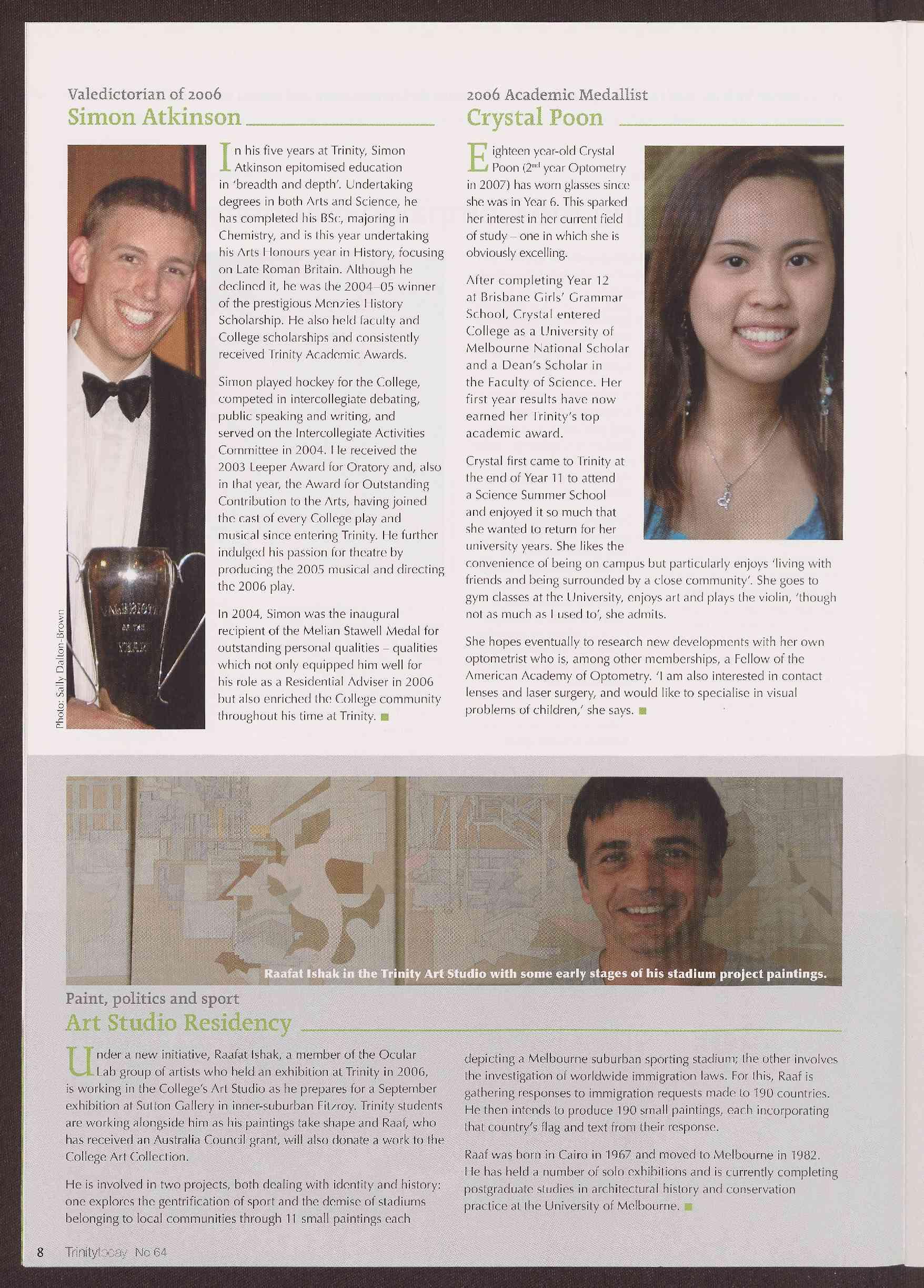
clitics and sport
nder a new initiative, Raafat Ishak, a member of the Ocular Lab group of artists who held an exhibition at Trinity in 2006, is working in the College's Art Studio as he prepares for a September exhibition at Sutton Gallery in inner-suburban Fitzroy. Trinity students are working alongside him as his paintings take shape and Raaf, who has received an Australia Council grant, will also donate a work to the College Art Collection.
He is involved in two projects, both dealing with identity and history: one explores the gentrification of sport and the demise of stadiums belonging to local communities through 11 small paintings each
depicting a Melbourne suburban sporting stadium; the other involves the investigation of worldwide immigration laws. For this, Raaf is gathering responses to immigration requests made to 190 countries. He then intends to produce 190 small paintings, each incorporating that country's flag and text from their response.
Raaf was born in Cairo in 1967 and moved to Melbourne in 1982. He has held a number of solo exhibitions and is currently completing postgraduate studies in architectural history and conservation practice at the University of Melbourne.
The Rotary Club of Melbourne has honoured two remarkable young Victorians, both of whom hold resident scholarships at Trinity. Ali Alamein (3rd year Engineering/Science) and Joseph Clifford (3rd year Commerce/Law) were presented with 2007 Young Achiever Awards by the Governor of Victoria, Professor David de Kretser, in the Grand Ballroom of the Windsor Hotel on 4 April.
Ali also received the prestigious Sir Albert Coates Award. The 21-year-old Iraqi refugee, who with his family spent a year in mandatory detention on Nauru before reaching Australia, was recognised for his efforts to help various migrant communities assimilate into mainstream Australian society, both as an interpreter and through involvement in sport, especially soccer. This year he is the President of the Carlton Youth Football Club, a project initiated and run by Trinity students to assist the integration of young, mainly African refugees living in public housing in Carlton.
Joe, 20, is an Indigenous student from Spotswood who has been elected the resident student body's first ever Community representative, with responsibility for coordinating all student activities in the areas of community service, social justice and cultural diversity. In 2005, Joe was chosen as an Australian Youth Ambassador to the World Expo in Aichi, Japan, and last year both Ali and Joe were named Goldman Sachs Global Leaders — two of only six in Australia and 100 worldwide — for their outstanding academic achievements and demonstrated success in addressing social problems. ■
Chamber Ensemble's `Sublime' début
Anewly formed Trinity Chamber Ensemble, combining strings and voices under the direction of the Dean, Dr Peter Tregear, gave its first concert in March, performing Jesus' blood never failed me yet (Gavin Bryars, 1943—) and Membra Jesu Nostri (Dieterich Buxtehude, 1637-1707).
'I had no idea I would be so enchanted by your memorable concert last night. It was a triumph. The musicians and choir were sublime. You must make a CD of it, Congratulations of a marvellous achievement, Jim [Nobel laureate Sir James Mirrlees) was as thrilled as I was.'
Patricia Mirrlees
The ensemble was created to provide an opportunity for resident instrumentalists and vocalists to workshop and perform significant works of both historical and contemporary Western art music. ■
(See page 28 for concerts coming up at Trinity)
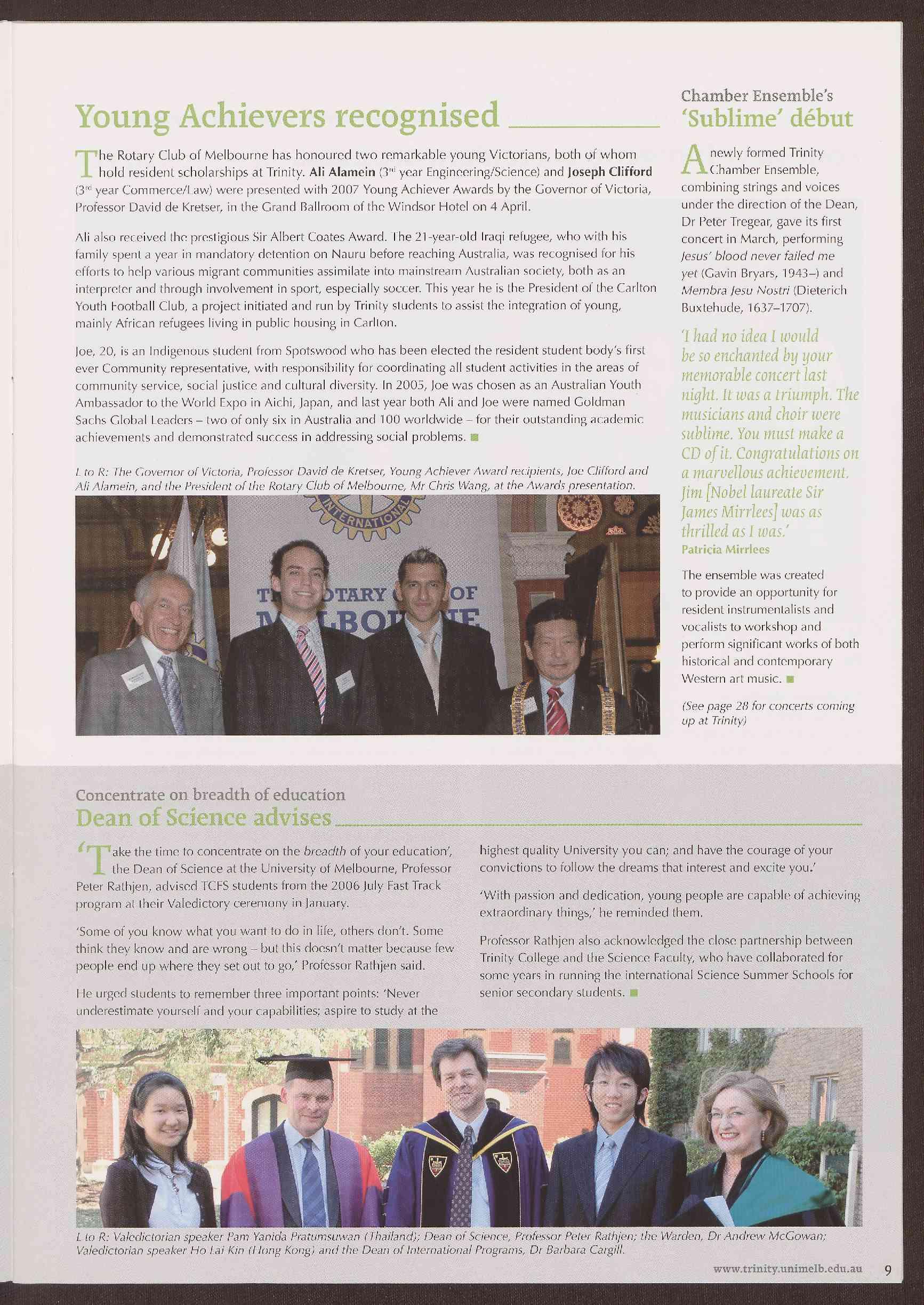
Concentrate on breadth of education Dea..
ake the time to concentrate on the breadth of your education', the Dean of Science at the University of Melbourne, Professor Peter Rathjen, advised TCFS students from the 2006 July Fast Track program at their Valedictory ceremony in January.
'Some of you know what you want to do in life, others don't. Some think they know and are wrong — but this doesn't matter because few people end up where they set out to go,' Professor Rathjen said.
He urged students to remember three important points: 'Never underestimate yourself and your capabilities; aspire to study at the
highest quality University you can; and have the courage of your convictions to follow the dreams that interest and excite you.'
'With passion and dedication, young people are capable of achieving extraordinary things,' he reminded them.
Professor Rathjen also acknowledged the close partnership between Trinity College and the Science Faculty, who have collaborated for some years in running the international Science Summer Schools for senior secondary students.
Ten 'indigenous students this year thanks to gene scholarshlly s° ppcat
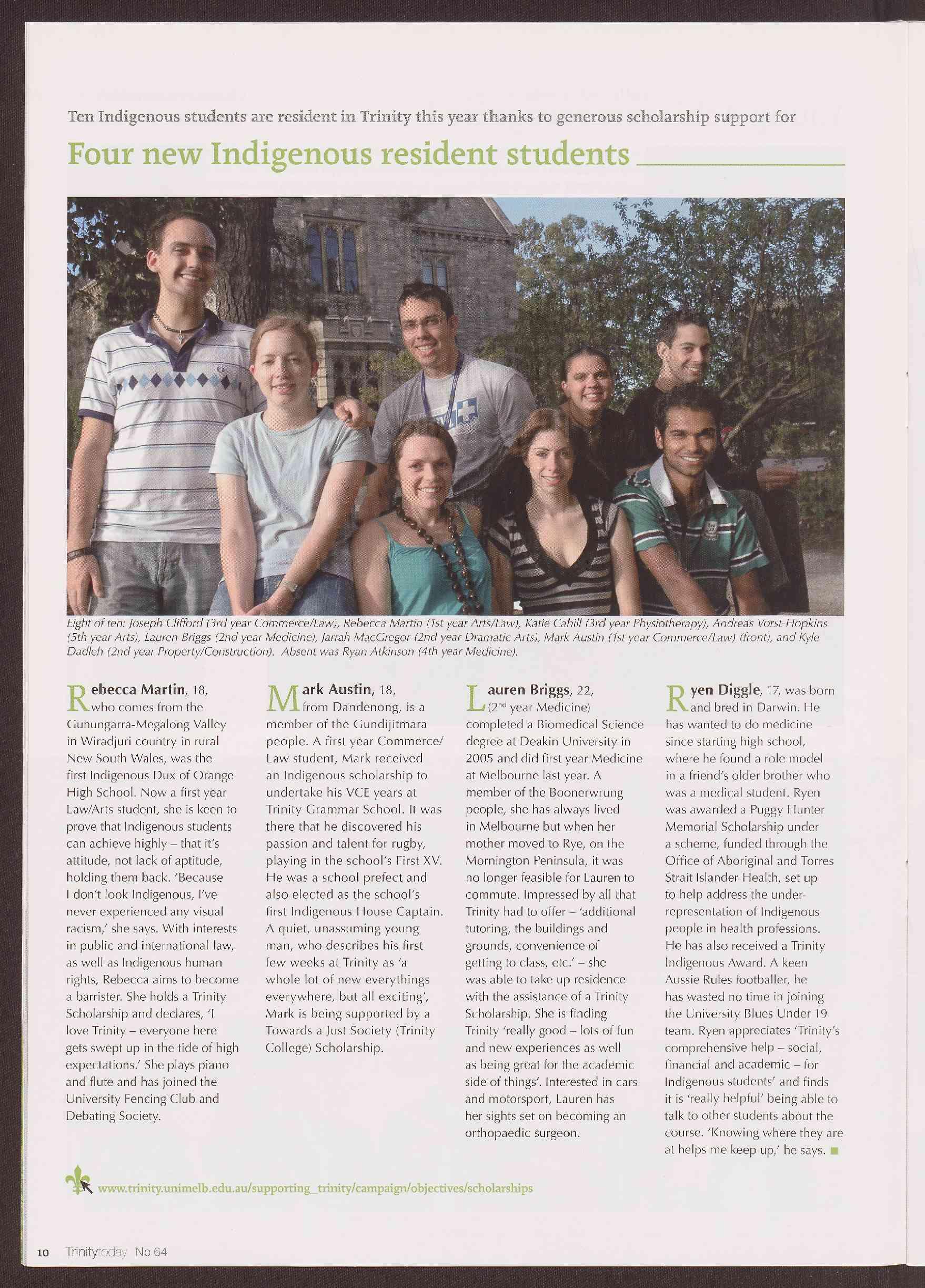
ebecca Martin, 18, who comes from the Gunungarra-Megalong Valley in Wiradjuri country in rural New South Wales, was the first Indigenous Dux of Orange High School. Now a first year Law/Arts student, she is keen to prove that Indigenous students can achieve highly —that it's attitude, not lack of aptitude, holding them back. 'Because I don't look Indigenous, I've never experienced any visual racism,' she says. With interests in public and international law, as well as Indigenous human rights, Rebecca aims to become a barrister. She holds a Trinity Scholarship and declares, 'I love Trinity — everyone here gets swept up in the tide of high expectations.' She plays piano and flute and has joined the University Fencing Club and Debating Society.
M.ark Austin, 18, from Dandenong, is a member of the Gundijitmara people. A first year Commerce/ Law student, Mark received an Indigenous scholarship to undertake his VCE years at Trinity Grammar School. It was there that he discovered his passion and talent for rugby, playing in the school's First XV. He was a school prefect and also elected as the school's first Indigenous House Captain. A quiet, unassuming young man, who describes his first few weeks at Trinity as 'a whole lot of new everythings everywhere, but all exciting', Mark is being supported by a Towards a Just Society (Trinity College) Scholarship.
T auren Briggs, 22, Li (2"d year Medicine) completed a Biomedical Science degree at Deakin University in 2005 and did first year Medicine at Melbourne last year. A member of the Boonerwrung people, she has always lived in Melbourne but when her mother moved to Rye, on the Mornington Peninsula, it was no longer feasible for Lauren to commute. Impressed by all that Trinity had to offer —'additional tutoring, the buildings and grounds, convenience of getting to class, etc.' — she was able to take up residence with the assistance of a Trinity Scholarship. She is finding Trinity 'really good — lots of fun and new experiences as well as being great for the academic side of things'. Interested in cars and motorsport, Lauren has her sights set on becoming an orthopaedic surgeon.
' www.trinity.unimelb.edu.au/supporting trinity/campaign/objectives/scholarships
yen Diggle, 17, was born and bred in Darwin. He has wanted to do medicine since starting high school, where he found a role model in a friend's older brother who was a medical student. Ryen was awarded a Puggy Hunter Memorial Scholarship under a scheme, funded through the Office of Aboriginal and Torres Strait Islander Health, set up to help address the underrepresentation of Indigenous people in health professions. He has also received a Trinity Indigenous Award. A keen Aussie Rules footballer, he has wasted no time in joining the University Blues Under 19 team. Ryen appreciates 'Trinity's comprehensive help — social, financial and academic — for Indigenous students' and finds it is 'really helpful' being able to talk to other students about the course. 'Knowing where they are at helps me keep up,' he says. ■
Statistics show that Indigenous Australians face a problem in just gaining access to quality tertiary education. Now a new program at Trinity is looking at
Former Darwin High School student Ryen Diggle is starting the first year of his medical degree with quiet determination. But as an Indigenous student he does so in the face of some fairly daunting statistics.
Entering university is in itself a major achievement for the 17 yearold — only 39.5% of Indigenous school students finish year 12, compared to 76.6% of nonIndigenous students. Furthermore, only 1.5% of students in tertiary education are Indigenous, a figure well below the percentage of Indigenous people in the Australian population.
This is compounded by the figures for completion of university studies: it is estimated that only 42% of Indigenous students complete their studies, compared to 76% of nonIndigenous students. Hence every effort to help prepare Indigenous Australian students for success at university is welcome.
This year, thanks to generous support from the Flora and Frank Leith Trust and the Jack Brockhoff Foundation, Trinity is embarking on an exciting project which, if successful, will lead to more Indigenous Australians entering, and succeeding in, study at the University of Melbourne and other universities.
Already, Trinity College Foundation Studies has an impressive track record in preparing overseas students for university study, as has the residential College in helping Indigenous undergraduates at the University of Melbourne to complete their degrees successfully. With this experience to draw on, the College is exceptionally well placed to extend its skills to helping academically able Indigenous Australian students from across the nation to progress to, and succeed at, university study.
There is much to do, however, before this new program of Indigenous Foundation Studies gets off the ground. Indigenous Programs Officer, Dr Jon Ritchie, armed with his experience in the residential College and in working with the Warden on College-wide affairs, is undertaking a program of far-reaching research and consultation, seeking out examples of best practice from other Australian and overseas tertiary institutions, and liaising with staff of the University of Melbourne, members of Indigenous community groups, and Trinity students and staff.
He anticipates developing a curriculum and business plan this year so that — all hurdles being jumped — the first cohort of students in the program could commence during 2008. A key aspect will be the securing of philanthropic support to allow students to study — and stay — at Trinity during their time in the program and Jon Ritchie
is keen to hear from anyone interested in supporting this program financially. He can be contacted on jritchie@trinity.unimelb.edu.au or +61 3 9348 7223.
With three Indigenous students having successfully completed degrees, and ten, including Ryen, currently in residence while undertaking studies in Arts, Commerce, Law, Medicine, Physiotherapy, Theatre Production, and Property and Construction, Trinity College in 2007 is an exciting and positive place to be for Indigenous students. ■
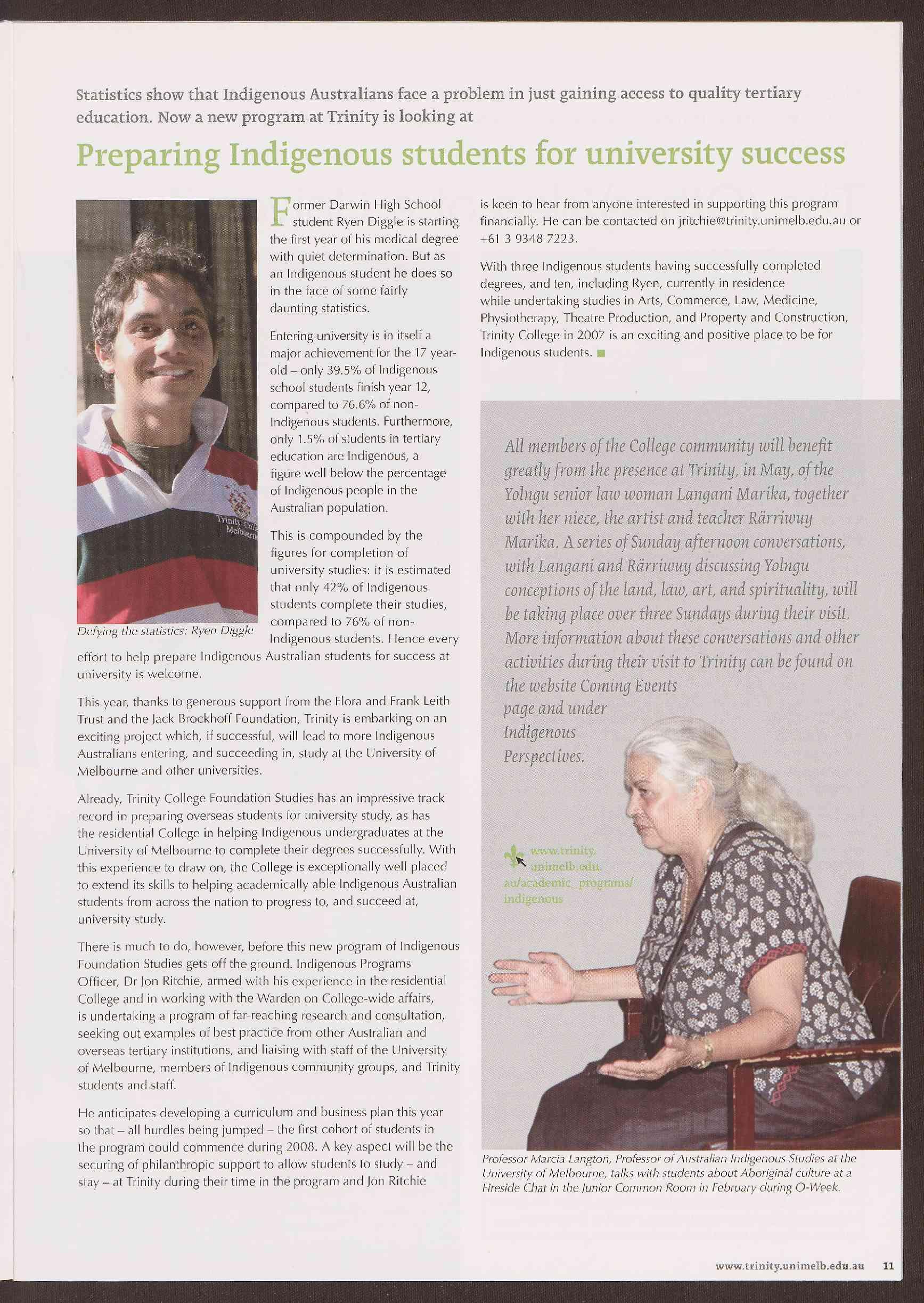
All members of the College community will benefit greatly from the presence at Trinity, in May, of the Yolugu senior law woman Langani Marika, together with her niece, the artist and teacher Rârriwuy Marika. A series of Sunday afternoon conversations, with Langani and Ríirrííwug discussing Yolngu conceptions of the land, law, art, and spirituality, will be taking place over three Sundays during their visit. More information about these conversations and other activities during their visit to Trinity can be found on the website Coming Events page and under Indigenous Perspectives,
Addressing incoming tutors in February, the 7th Warden, Dr Andrew McGowan, argued that in concentrating on 'curriculum' Australian tertiary institutions have overlooked the importance of 'community'. This is an edited version of that address.
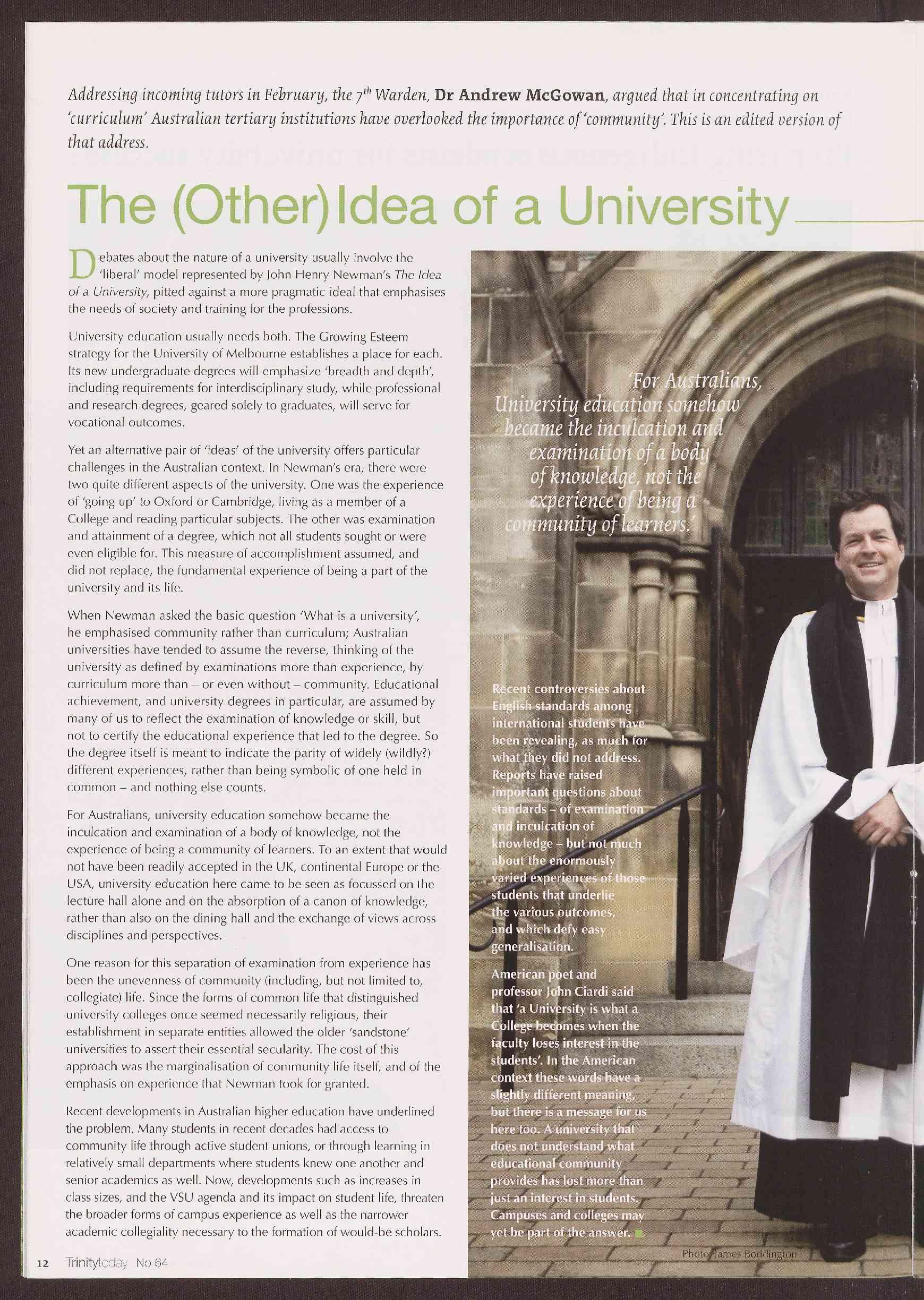
ebates about the nature of a university usually involve the 'liberal' model represented by John Henry Newman's The Idea of a University, pitted against a more pragmatic ideal that emphasises the needs of society and training for the professions.
University education usually needs both. The Growing Esteem strategy for the University of Melbourne establishes a place for each. Its new undergraduate degrees will emphasize 'breadth and depth', including requirements for interdisciplinary study, while professional and research degrees, geared solely to graduates, will serve for vocational outcomes.
Yet an alternative pair of 'ideas' of the university offers particular challenges in the Australian context. In Newman's era, there were two quite different aspects of the university. One was the experience of 'going up' to Oxford or Cambridge, living as a member of a College and reading particular subjects. The other was examination and attainment of a degree, which not all students sought or were even eligible for. This measure of accomplishment assumed, and did not replace, the fundamental experience of being a part of the university and its life.
When Newman asked the basic question 'What is a university', he emphasised community rather than curriculum; Australian universities have tended to assume the reverse, thinking of the university as defined by examinations more than experience, by curriculum more than — or even without — community. Educational achievement, and university degrees in particular, are assumed by many of us to reflect the examination of knowledge or skill, but not to certify the educational experience that led to the degree. So the degree itself is meant to indicate the parity of widely (wildly?) different experiences, rather than being symbolic of one held in common — and nothing else counts.
For Australians, university education somehow became the inculcation and examination of a body of knowledge, not the experience of being a community of learners. To an extent that would not have been readily accepted in the UK, continental Europe or the USA, university education here came to be seen as focussed on the lecture hall alone and on the absorption of a canon of knowledge, rather than also on the dining hall and the exchange of views across disciplines and perspectives.
One reason for this separation of examination from experience has been the unevenness of community (including, but not limited to, collegiate) life. Since the forms of common life that distinguished university colleges once seemed necessarily religious, their establishment in separate entities allowed the older 'sandstone' universities to assert their essential secularity. The cost of this approach was the marginalisation of community life itself, and of the emphasis on experience that Newman took for granted.
Recent developments in Australian higher education have underlined the problem. Many students in recent decades had access to community life through active student unions, or through learning in relatively small departments where students knew one another and senior academics as well. Now, developments such as increases in class sizes, and the VSU agenda and its impact on student life, threaten the broader forms of campus experience as well as the narrower academic collegiality necessary to the formation of would-be scholars.
: ralí
University e---tïon sqmeh w became the inculcation a ,'
ëxaminatton:~f a body
¢ ~ of knowledgenot the ~xperience o~being a munitg o f l~rners!µ
Recent controversies about English standards among international students have been revealing, as much for what they did not address. Reports have raised important questions about standards of examination and inculcation of knowledge — but not about the enor ousl varied expel.' students that under' the various outcomes, and which defy easy generalisation.
American poet and professor John Ciardi said that 'a University is what ._ College becomes when the faculty loses interest in th students'. in the American context these words have= slightly different meaning but there is a message here too. A university' does not understand wha educational community 'Y provides has lost more than just an interest in, students. Campuses and colleges may yet be part of the answer.
1
Andrew McGowan is the o Trinity has ever appointedFor the urio Leeper was 37, Behan 36, Cowan 32, Sh o ,, Burge 41 and Markwell 38.
2
In t 70s, he played guitar in the rock band tha came the Triffids, going to school at Christ Church Grammar:' in Perth with late singer-songwriter David McComb. He is contributing to a book about the Triffids to be published later this year.
He supports Geelong, and his parents both grew up there. He also attended every home game of the Notre Darne'Fighting Irish' American football team while a postgraduate student there in Indiana, and follows the Boston Red Sox in baseball.
The first West Australian schools' debating team to win the Australian national title did so in 1978 — with. Andrew as their first speaker. WA had not won a single debate in the previous two years of competition.
He lived for five years next door to the ,. former home of the poet Henry Wadsworth n Cambridge, Mass chusetts, whetta or at the Episcopal Divin y School there ,articles ancient
Apossible exchange partnership between Trinity and Morningside College, one of several new colleges currently being built at the Chinese University of Hong Kong (CUHK), was among items discussed when the Vice-Chancellor of that University, Professor Laurence Lau, visited Trinity in December 2006.
Professor Lau expressed his wish for a close relationship between Trinity and Morningside, whose Founding Master will be Professor Sir James Mirrlees, Nobel laureate in Economics and Visiting Scholar at Trinity in 2005-07. Commencing in autumn of 2008, Professor Lau and Professor Mirrlees hope to be able to offer Morningside students exchange places at Trinity, with our students undertaking reciprocal periods in Hong Kong.
Morningside's dedication to service — also a core value and the preferred leadership model at Trinity — is reflected in the fact that every student at Morningside College will be required to undertake community service work. ■
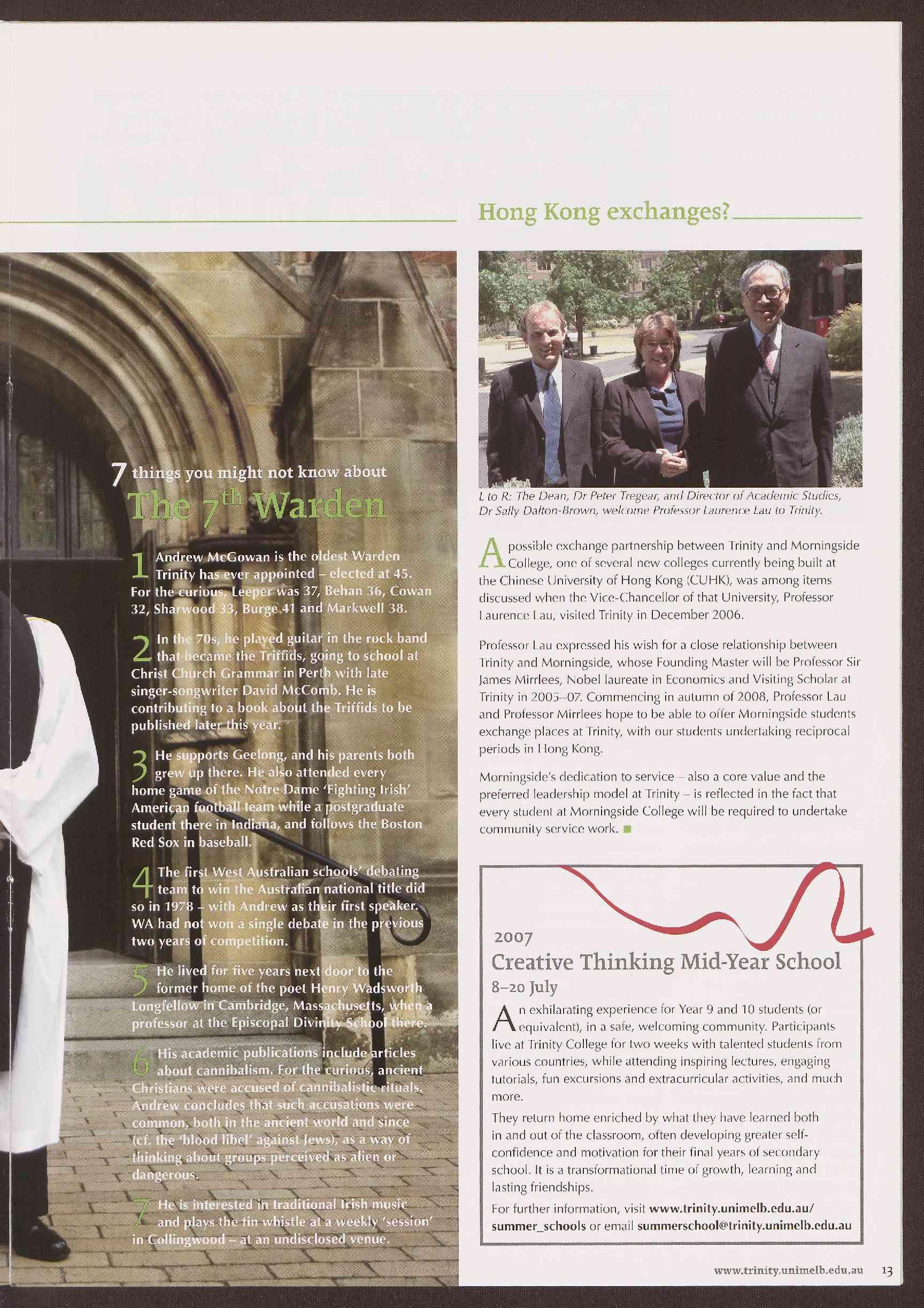
8-20 July
An exhilarating experience for Year 9 and 10 students (or equivalent), in a safe, welcoming community. Participants live at Trinity College for two weeks with talented students from various countries, while attending inspiring lectures, engaging tutorials, fun excursions and extracurricular activities, and much more.
They return home enriched by what they have learned both in and out of the classroom, often developing greater selfconfidence and motivation for their final years of secondary school. It is a transformational time of growth, learning and lasting friendships.
For further information, visit www.trinity.unimelb.edu.au/ summer_schools or email summerschool@trinity.unimelb.edu.au
The Randolph Creswell Engineering Scholarship was established in 2004 by a group of alumni to honour their friend's memory and to assist 'a talented engineering student who is likely to make an outstanding contribution to both the College and to the profession of engineering', Its inaugural recipient, Tim Foster, was Senior Student for 2005-06 and his final year engineering project has already transformed lives on the other side of the world. Here he tells of
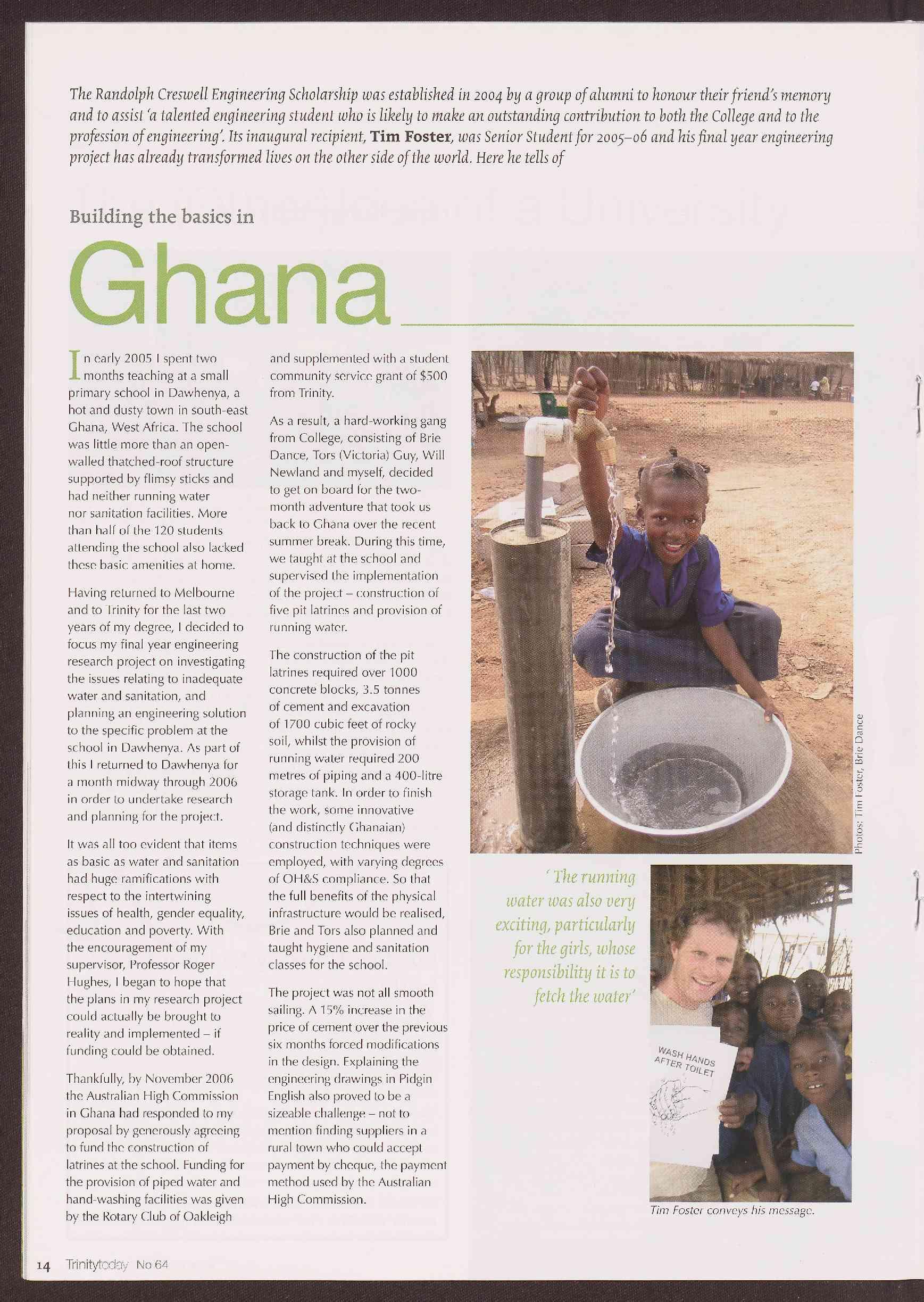
In early 2005 I spent two months teaching at a small primary school in Dawhenya, a hot and dusty town in south-east Ghana, West Africa. The school was little more than an openwalled thatched-roof structure supported by flimsy sticks and had neither running water nor sanitation facilities. More than half of the 120 students attending the school also lacked these basic amenities at home.
Having returned to Melbourne and to Trinity for the last two years of my degree, I decided to focus my final year engineering research project on investigating the issues relating to inadequate water and sanitation, and planning an engineering solution to the specific problem at the school in Dawhenya. As part of this I returned to Dawhenya for a month midway through 2006 in order to undertake research and planning for the project.
It was all too evident that items as basic as water and sanitation had huge ramifications with respect to the intertwining issues of health, gender equality, education and poverty. With the encouragement of my supervisor, Professor Roger Hughes, I began to hope that the plans in my research project could actually be brought to reality and implemented — if funding could be obtained.
Thankfully, by November 2006 the Australian High Commission in Ghana had responded to my proposal by generously agreeing to fund the construction of latrines at the school. Funding for the provision of piped water and hand-washing facilities was given by the Rotary Club of Oakleigh
and supplemented with a student community service grant of $500 from Trinity.
As a result, a hard-working gang from College, consisting of Brie Dance, Tors (Victoria) Guy, Will Newland and myself, decided to get on board for the twomonth adventure that took us back to Ghana over the recent summer break. During this time, we taught at the school and supervised the implementation of the project — construction of five pit latrines and provision of running water.
The construction of the pit latrines required over 1000 concrete blocks, 3.5 tonnes of cement and excavation of 1700 cubic feet of rocky soil, whilst the provision of running water required 200 metres of piping and a 400-litre storage tank. In order to finish the work, some innovative (and distinctly Ghanaian) construction techniques were employed, with varying degrees of OH&S compliance. So that the full benefits of the physical infrastructure would be realised, Brie and Tors also planned and taught hygiene and sanitation classes for the school.
The project was not all smooth sailing. A 15% increase in the price of cement over the previous six months forced modifications in the design. Explaining the engineering drawings in Pidgin English also proved to be a sizeable challenge — not to mention finding suppliers in a rural town who could accept payment by cheque, the payment method used by the Australian High Commission.
' The running water was also very exciting, particularly for the girls, whose responsibility it is to fetch the water'
Working in a developing country, there were times when the engineering principles I learnt at University flew right out the window, with more reliance being placed on practical experience and local knowledge than on scientific principles. For example, connecting running water was as much to do with cutting through the red tape of the local water company as it was with technical aspects. Similarly, the Ghanaians had never studied geotechnical principles or taken soil samples to test for soil strength — they just knew from experience that the soil was rocky and unstable and that suitable ground could only be found by excavating to a depth of 10 feet.
The extremely tight two-month time frame, together with the laid-back Ghanaian way of life, also created some doubt as to whether the project would actually be completed in time.
But despite these obstacles — and with a sense of urgency not often seen in Dawhenya — the water pipes and latrines were completed on schedule, much to the delight of the students, who were very excited. Most of them had never used a toilet
`It was extremely satisfying o see the construction develop into functional facilities that will hopefully have a positive long-term impact, '
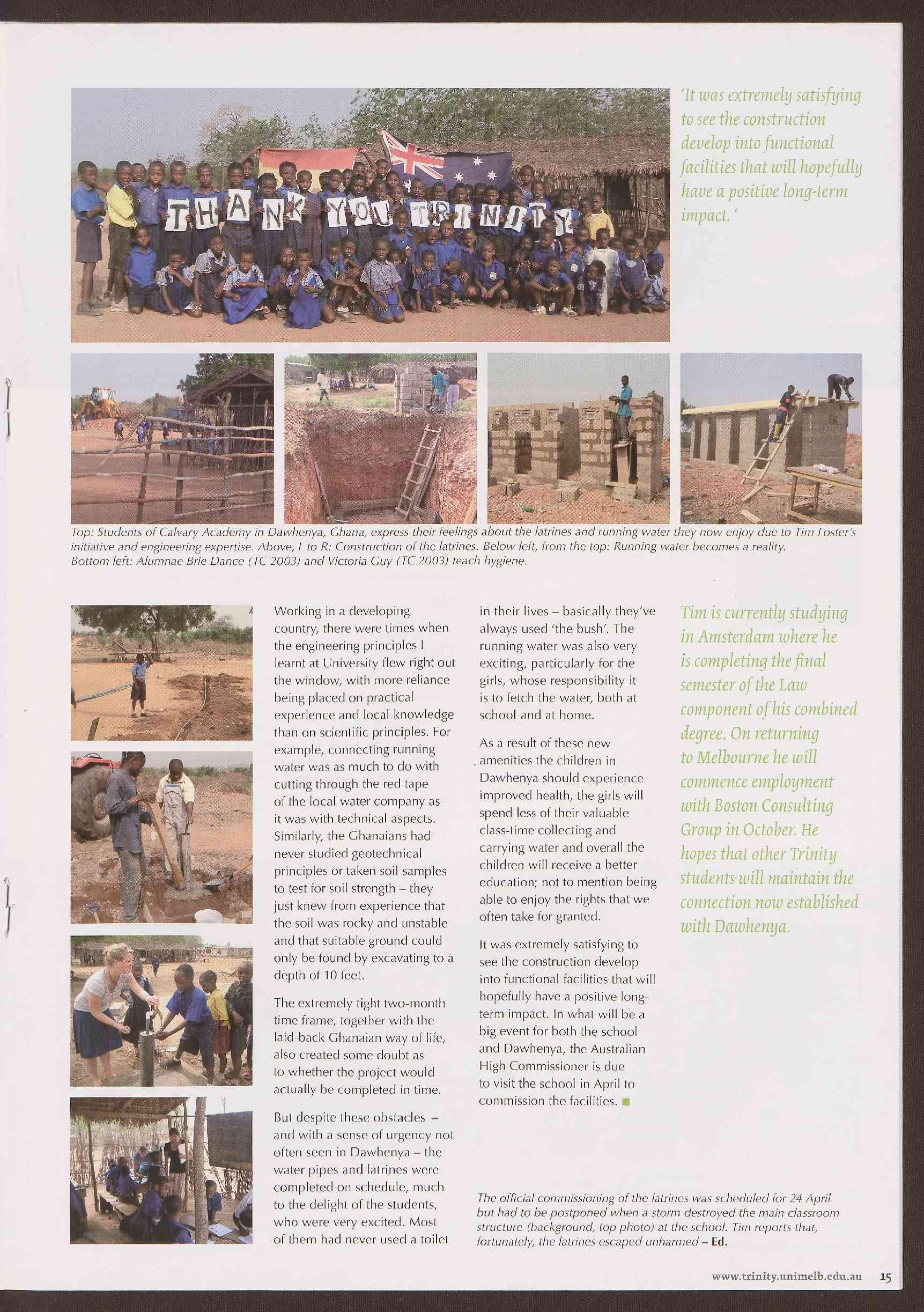
in their lives — basically they've always used 'the bush'. The running water was also very exciting, particularly for the girls, whose responsibility it is to fetch the water, both at school and at home.
As a result of these new . amenities the children in Dawhenya should experience improved health, the girls will spend less of their valuable class-time collecting and carrying water and overall the children will receive a better education; not to mention being able to enjoy the rights that we often take for granted.
It was extremely satisfying to see the construction develop into functional facilities that will hopefully have a positive longterm impact. In what will be a big event for both the school and Dawhenya, the Australian High Commissioner is due to visit the school in April to commission the facilities. ■
Tim is currently studying in Amsterdam where he is completing the final semester of the Law component of his combined degree, On returning to Melbourne he will commence employment with Boston Consulting Group in October, He hopes that other Trinity students will maintain the connection now established with Dawhenya.
The official commissioning of the latrines was scheduled for 24 April but had to be postponed when a storm destroyed the main classroom structure (background, top photo) at the school. Tim reports that, fortunately, the latrines escaped unharmed — Ed.
uring Melbourne's prolonged drought the survival of Trinity's many fine old trees has been ofprime concern. With the kind assistani of expert friends of the College, including a director of the Botanic Gardens, a noted landscape architect and a generous alumnus, urgent remedial work has been undertaken to save the trees and other major plantings. `As with the College Oak, shown here, soaker, hoses fed by water-filled plastic traffic barriers have been laid around many of the trees and covered in mulch. Through these and other measures, implemented in line with current water restrictions, no trees have been lost to date and the tranquil ambience they impart to the campus-has been preserved.
AChoral Eucharist and celebratory lunch on 3 December 2006 marked the 50'" anniversary of the Canterbury Fellowship's move to Trinity College.
Founded in 1936 by Dr James Darling, this non-parochial Anglican congregation was originally known as the St John's Fellowship and was based at St John's Church in La Trobe Street, Melbourne. In late 1956 when this church was sold, the future of the Fellowship looked precarious — until the then Chaplain of Trinity College, the Revd Alfred Bird, and the Warden, Ronald Cowan, invited the group to move to the Trinity College Chapel.
Thus began a remarkable working relationship between the two congregations, which continues to this day. The Fellowship celebrates a Eucharist every Sunday morning at 10am and maintains all the traditional services of Christmas and Easter. This co-operation also enables Choral Evensong to be sung in the Chapel at 6pm every Sunday of the year (except during January), either by the Choir of Trinity College (during University terms), or by the Fellowship's own very fine Choir (outside of term time). ■

hen the ER White Club's 2006 artwork purchase, Strangers in a Strange Land by Anne Zahalka, was officially unveiled by Dr Alison Inglis at the commencement of 2007, it prompted resident tutor Dr Margaret Grose to reflect on the landscape it depicts — Western Australia's intriguing Pinnacle Desert. Margaret knows this area well and her informative article is published online.
6 R www.trinity.unimelb.edu.au/ resources/art_collection/er_white
unchtime Concerts in the Trinity College Chapel, 1.10pm — 2pm, every Thursday during term.
The Director of Music, Michael Leighton Jones, invites you to bring your sandwiches — and your friends — to enjoy this new recital series featuring a diverse range of instrumental and vocal soloists and small ensembles. Gold coin donation. View the programs at
wvvw.trinity.unimelb.edu.au/campus_life/choir/schedule/ thursday_concerts
resent and past Trinity choristers featured in a concert given by the touring UK-based Tallis Scholars — described by The New York Times as 'the rock stars of Renaissance music'— at the Arts Centre's Hamer Hall on 2 February.
What'The Australian said ...
'Spem in alium remains one of the luminous landmarks of Renaissance composition and it was revealed in all its splendour at Friday's concert. The 10 Tallis Scholars were joined by 30 choristers drawn from present and former members of the choir of Trinity College, Melbourne.
The combined ensemble skilfully negotiated Tallis's intricate motet, with glorious singing from the eight five-part choirs and with the Tallis Scholars performing as firsts among equals. Spem in ilium was sung before interval, and again at the end of the concert.
There was a brief moment of hesitation within the first performance, followed by a flawless second hearing.'
and:
'In the first half, singers from the choir of Trinity College, excellently prepared by Peter Tregear, sang Anton Bruckner's Locus lste and Os /asti (in a particularly moving performance), a sparkling reading of Gerald Finzi's My spirit sang all day and Maurice Durufle's Tota pulchra es Maria, Tu es Petrus and Tantum Ergo.'
— Peter Burch, music critic for The Australian, 6 February 2007.
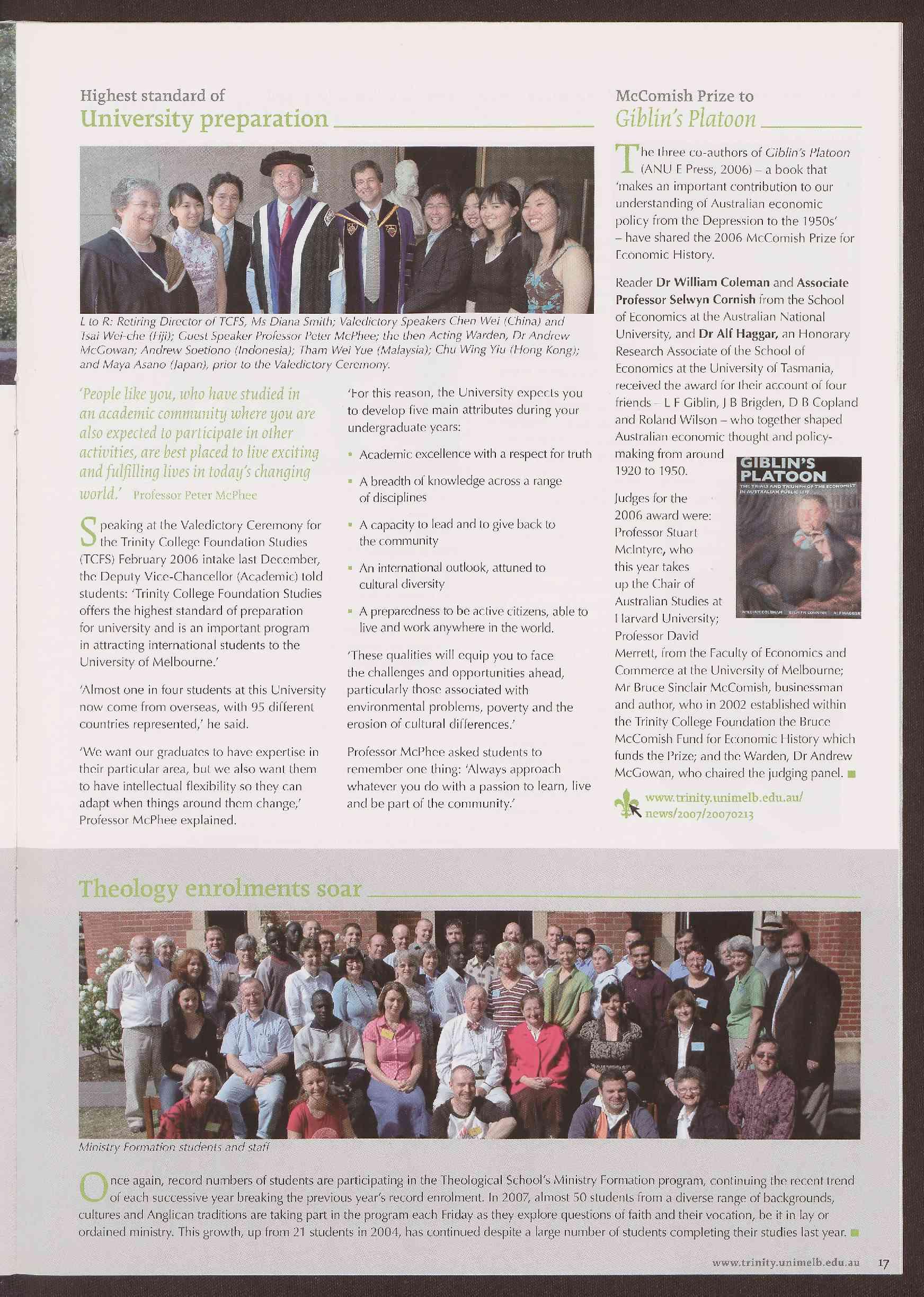
L to R: Retiring Director of TCFS, Ms Diana Smith; Valedictory Speakers Chen Wei (China) and Tsai Wei-che (Fiji); Guest Speaker Professor Peter McPhee; the then Acting Warden, Dr Andrew McGowan; Andrew Soetiono (Indonesia); Tham Wei Yue (Malaysia); Chu Wing Yiu (Hong Kong); and Maya Asano (Japan), prior to the Valedictory Ceremony.
`People like you, who have studied in an academic community where you are also expected to participate in other activities, are best placed to live exciting and fulfilling lives in today's changing world.' Professor Peter McPhee
Speaking at the Valedictory Ceremony for the Trinity College Foundation Studies (TCFS) February 2006 intake last December, the Deputy Vice-Chancellor (Academic) told students: 'Trinity College Foundation Studies offers the highest standard of preparation for university and is an important program in attracting international students to the University of Melbourne.'
'Almost one in four students at this University now come from overseas, with 95 different countries represented,' he said.
'We want our graduates to have expertise in their particular area, but we also want them to have intellectual flexibility so they can adapt when things around them change,' Professor McPhee explained.
'For this reason, the University expects you to develop five main attributes during your undergraduate years:
• Academic excellence with a respect for truth
• A breadth of knowledge across a range of disciplines
• A capacity to lead and to give back to the community
• An international outlook, attuned to cultural diversity
• A preparedness to be active citizens, able to live and work anywhere in the world.
'These qualities will equip you to face the challenges and opportunities ahead, particularly those associated with environmental problems, poverty and the erosion of cultural differences.'
Professor McPhee asked students to remember one thing: 'Always approach whatever you do with a passion to learn, live and be part of the community.'
The three co-authors of Giblin's Platoon (ANU E Press, 2006) — a book that 'makes an important contribution to our understanding of Australian economic policy from the Depression to the 1950s' — have shared the 2006 McComish Prize for Economic History.
Reader Dr William Coleman and Associate Professor Selwyn Cornish from the School of Economics at the Australian National University, and Dr Alf Haggar, an Honorary Research Associate of the School of Economics at the University of Tasmania, received the award for their account of four friends — L F Giblin, J B Brigden, D B Copland and Roland Wilson — who together shaped Australian economic thought and policymaking from around 1920 to 1950.
Judges for the 2006 award were: Professor Stuart McIntyre, who this year takes up the Chair of Australian Studies at Harvard University; Professor David Merrett, from the Faculty of Economics and Commerce at the University of Melbourne; Mr Bruce Sinclair McComish, businessman and author, who in 2002 established within the Trinity College Foundation the Bruce McComish Fund for Economic History which funds the Prize; and the Warden, Dr Andrew McGowan, who chaired the judging panel. ■ www. trinity. unimelb . e du. au/ news/zoo7/2oo7o213
nce again, record numbers of students are participating in the Theological School's Ministry Formation program, continuing the recent trend of each successive year breaking the previous year's record enrolment. In 2007, almost 50 students from a diverse range of backgrounds, cultures and Anglican traditions are taking part in the program each Friday as they explore questions of faith and their vocation, be it in lay or ordained ministry. This growth, up from 21 students in 2004, has continued despite a large number of students completing their studies last year.
just as students apply their multiple talents in a variety of arenas beyond the College, so too do staff.

Congratulations to 1-11
r Barbara Cargill, Dean of International Programs, who in March was granted her Doctorate of Business Administration from the Australian Graduate School of Entrepreneurship at Swinburne University of Technology for a thesis entitled: 'Models of Organisational and Managerial Capability for the Entrepreneurial University in Australia'.
Dr Felicity Fallon, Director of Student Welfare (TCFS) was elected President of ISANA International Education Association. In this role, she attended the conference of the Asia-Pacific Association for International Education (APAIE), Asia-Pacific Renaissance in Higher Education, in Singapore in early March, where she gave a presentation entitled 'Recent Research Related to the Education and Support of International Students Studying in Australia and New Zealand.'
Samantha Semmens, Literature Lecturer (TCFS), last year completed her Bachelor of Fine Art (Sculpture and Spatial Practice) at the Victorian College of the Arts, receiving the Fiona Myer Award for sculpture completed during the final year of the degree. Samantha also has a combined Honours degree in Philosophy and Social Theory, and a Master's degree in Literature from the University of Melbourne.
he Dean of International Programs, Dr Barbara Cargill, recently presented cheques to ten students in the February 2007 intake whose outstanding academic records earned them these highly competitive scholarships, each valued at $2,500.
Scholarship recipients pictured with Dr Cargill are, L to R, Back Row: Wong Wai Han (Malaysia), Tan Min-on (Malaysia), Lan Yang (China). Middle Row: Le Truong Son (Vietnam), Zhou Jia (China), Muhammad Abid Hasan (Bangladesh), Ms Kartini Ayuningtyas Putri (Indonesia). Front Row: Wong Siaw Hui (Malaysia), Wuong Sze Shien Melanie (Malaysia), Chu Melissa Min Hui (Singapore). A further recipient, Tay Jun Hoe (Malaysia), was not present for the photo.
Bell, left, stands aside as the St Petersburg train comes through
and a change of scene for
im Bell, Director of IT, assumed a somewhat different role for a week in March when he officiated as an ice-hockey linesman for the World Police and Fire Games in Adelaide, having been appointed as an International Linesman in February. Tim is also a trumpeter of considerable note and a member of the Choir of Christ Church, South Yarra.
The Dean, Dr Peter Tregear, was invited to lecture and perform as a vocal soloist as part of the Palestine Mozart Festival 2007. Over the Easter break he performed in concerts in Jerusalem, Ramallah, and Bethlehem.
Barbara Trauer, Mathematics Lecturer (TCFS), spent a month in Malawi last June as a volunteer maths teacher and is planning to return again this year. In a country where there can be over one hundred students in a primary class, but no tables, chairs, books or pencils, her presence really makes a difference. ■

College Chaplain for the last four years, the Revd Dr Richard Treloar this month takes up a new appointment as Vicar of Christ Church, South Yarra.
As both priest and scholar, Richard has given outstanding leadership to the College's highly capable Chaplaincy team — charged with providing pastoral care for the whole College community and ensuring that the Chapel is a lively centre of worship where all are welcome — while also teaching in the Theological School as Stewart Lecturer in Theology.
Richard trained for ministry in the Trinity College Theological School and was both a resident (1988) and non-resident (1989-90) student. Following his ordination, he served in a number of parishes in the Dioceses of Ballarat and Melbourne before returning to Trinity in 1998 as Associate Chaplain and Turner Research Fellow and Lecturer in the Theological School. In 2003, he was appointed Chaplain, and in the same year was awarded his PhD by Monash University.
A keen sportsman, Richard also enjoyed contributing to the life of the College through his seven-year stint as a member of the College squash team that won five Intercollegiate premierships during that period.
The College has been the richer for his gentle and sincere ministry, his great intellectual capacity, his attention to detail and his warm friendship. We wish him well in his new role, and know he will continue to serve the Church with dedication and distinction.
Richard leaves the pastoral and spiritual care of the College community in very good hands. The Revd Robin Elliott joined the Chaplaincy team in January this year, assuming particular responsibility for the pastoral care of the resident student community and the liturgical life of the Chapel.
Robin comes, with wife Susannah, from the Parish of Bass-Phillip Island in the Diocese of Gippsland, where he has been Rector for the past four years. He was previously a parish priest in the Diocese of Adelaide, where he also trained for ordination at St Barnabas'
College and Flinders University, having previously studied at Adelaide University. He is currently undertaking postgraduate research studies in Theology.
Robin expresses a concern to 'deal with whole people, spiritual and intellectual as well as social and physical'. He has sung in the chorus of the State Opera of South Australia and retains a keen interest in music.
The Revd Kim Cruickshank continues to provide her specialised, supportive ministry to the multi-faith community of Trinity College Foundation Studies (TCFS). In 2003, Kim created 'The Space', a special area in the Swanston Street campus where TCFS students of all faith traditions come to pray, meditate, or simply meet to chat with each other or with Kim, who constantly encourages them to 'relax, reflect and remember'.
Trinity College describes itself as 'an Anglican institution, welcoming people of all faiths and none'. The new Chaplaincy team will ensure this philosophy continues to flourish. ■
n an academic partnership with Trinity now spanning some six years, the University of Delaware, USA, brings students here each January under their Study Abroad program. This year's visit involved courses in Engineering, English and Nursing, with ten faculty members accompanying the 120 students for their 'down under' educational experience. In addition to classes at Trinity, nursing students spent time at local hospitals and the chemical engineers used the University's resources. With all the necessary facilities, accommodation, teaching and recreational spaces — as well as its distinctive academic ambience — Trinity is ideally placed to host such international, interstate or local learning programs. Conference Manager Mark Gordon also knows how to ensure students get the maximum benefit from their time here. If you are arranging a course, meeting or other gathering, it's worth talking to Mark to find out how he can help. EMAIL: conference@trinity.unimelb.edu.au
TEL: +61 3 9348 7550
It must be said
That in the end, silence and absence Are the enduring absolutes.
These lines come from Peter's fifth book of poems which was launched by former Senator the Hon. John Button at The Avenue Bookshop, Albert Park, on 30 November 2006. Entitled Another Place, the book costs $25 and can be purchased from the Trinity College Development Office. All proceeds go to support Indigenous scholars at Trinity.
H Mei Chi (Virginia) (TCFS 1996) graduated MBBS in 2002 and is now working as a cardiac surgery registrar at the Austin Hospital.
Lau Yui Man, Joanne (TCFS 2000), from Hong Kong, has a BSc majoring in Biochemistry from the University of Melbourne and is now undertaking a Masters in Public Health at the University of Sydney.
Emily Chapp (2001) completed her Master's degree in geology and geophysics at the University of Hawaii and currently works for Chevron as a geophysicist in New Orleans, LA.
Noah Harlan (1996), a New York-based writer, filmmaker, teacher and producer whose feature films have screened in international film festivals, including Cannes and Berlin, is co-author of a recently published children's guide to manners called Mind Your Manners, Dick & Jane (Penguin, 2006). He is also an oral storyteller with the SpeakEasy group, performing in Manhattan and Brooklyn.
Gareth Benson (1996) is now living in Sydney working at CSIRO in intellectual property law and doing a postgraduate commerce course. Gareth has also made eight short films and continues to produce films in Melbourne, Canberra and Sydney.
www.afterpartyproductions.com.au
Kyle Gerrity (2004) completed his History degree from Georgetown in June 2006. He is currently working as an Investment Banking Analyst with Morgan Stanley in Sydney.
Carole Hinchcliff (née Taylor) (1978) is currently Associate Director of the College of Law library and an Associate Professor — Clinical in the Moritz College of Law at The Ohio State University.
The Venerable Peter Stanley (1979) has been appointed Rector of the Anglican Parish of the Eastern Goldfields in the Diocese of Perth and has been made an Archdeacon Emeritus, effective from October 2006.
The Revd Jan Joustra (1988) was installed as the new Dean of Waikato, New Zealand, at the Cathedral Church of St Peter in Hamilton on 4 February. A former resident Theology student, Jan was ordained in the Diocese of Wangaratta and has held positions in Hong Kong and Monaco. He is married to Linda and has two children, Gabriella, 13, and Oliver, 12. He is also well known as a creator of church vestments.
C www.stpeterscathedral.nzl.org/items/zoo6-o9-zz_dean.php
Dr Patrick Charles (1989) is a full-time physician in infectious diseases and general medicine at Austin Health in Melbourne. He lives in Camberwell with wife, Catherine, and 17-month-old daughter, Molly.
James Murray (1990) and wife Katherine (née Riggall) moved to Singapore in April 2006 after spending eight months back in Melbourne. James has since returned to work at New York law firm Milbank Tweed. Their son, Sam, is now three years old and their second child, Alice, was born in Singapore in May 2006.
John Wion (1955) has been honoured by the National Flute Association (USA) with a lifetime achievement award, 'bestowed on the inspiring individuals who have been the most honored performers, teachers and instrument makers'.
John, who was Principal Flutist of the New York City Opera for 37 years, will give a recital with Stephen McIntyre (piano) at Trinity on Sunday 27 May at 2pm. (See page 28.)
°www.nfaonline.org/pdfs/conv2007NF.?,"
Professor Kenneth Hinchcliff (1976) to head Veterinary
Kenneth is currently head of Equine Medicine and Surgery at The Ohio State University in Columbus, Ohio, but will be returning to the University of Melbourne in July 2007 as Dean of the Faculty of Veterinary Science. After graduating BVSc from Melbourne in 1980, Professor Hinchcliff gained a Master of Science from the University of WisconsinMadison in 1987 and a PhD from Ohio State University in 1990. His area of research is in equine, canine and human exercise physiology and equine medicine. He has been the lead author of a number of textbooks and has published over 150 peer-reviewed papers.
Tan Da Wei (TCFS 2005) and his brother Tan Zhe Wei were the first two figure skaters ever to represent Malaysia at the Asian Winter Games held in Chang Chun, China, in February this year. Describing it as 'a once in a lifetime experience', Da Wei says, 'Never had I competed in such an immense event with such a large audience, cheering and applauding each routine. The opening ceremony was just sensational with amazing performances and a dazzling display of fireworks.' Da Wei has temporarily hung up his skates now to concentrate on his 15' year Dentistry studies at the University of Melbourne.
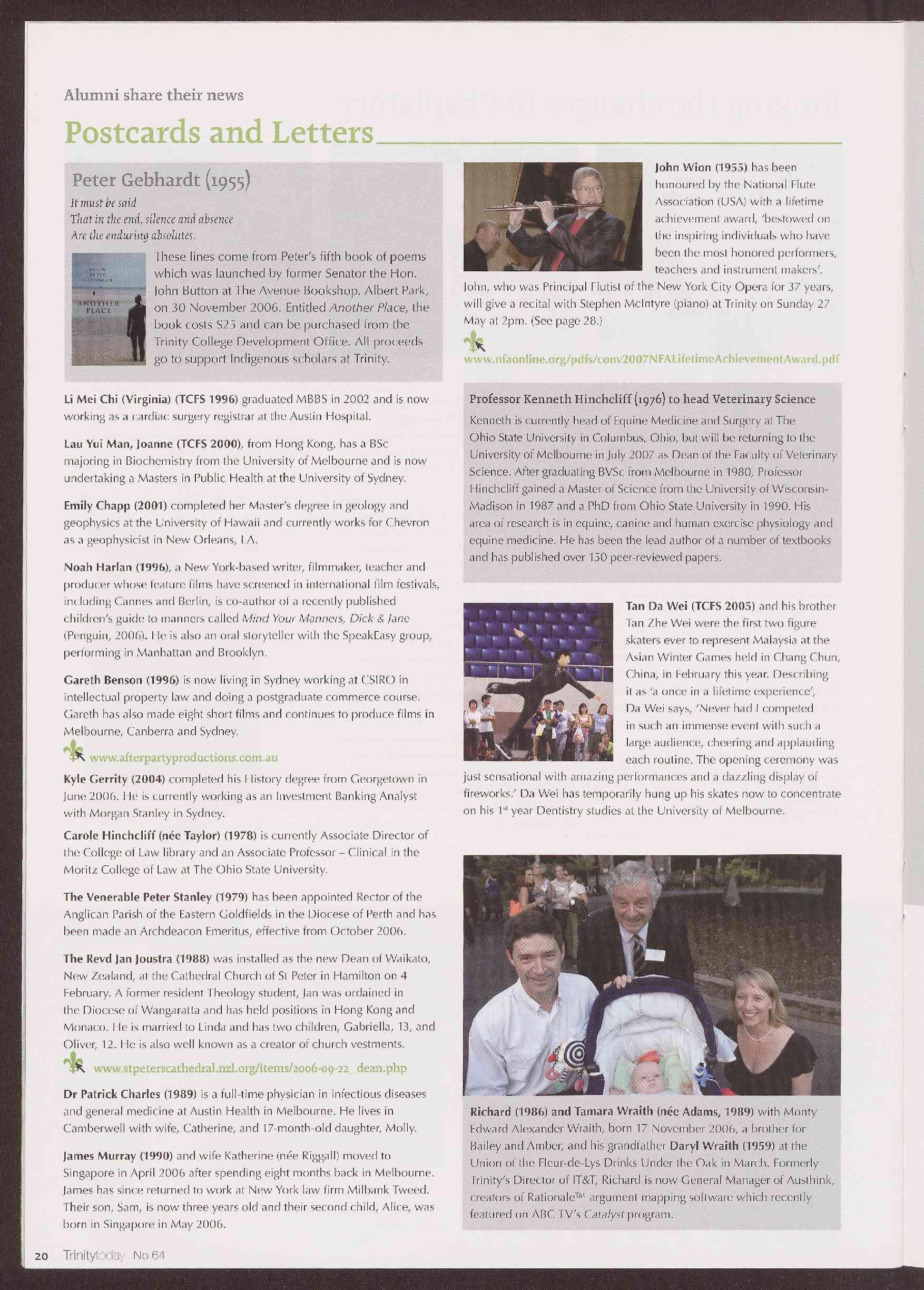
Richard (1986) and Tamara Wraith (née Adams, 1989) with Monty Edward Alexander Wraith, born 17 November 2006, a brother for Bailey and Amber, and his grandfather Daryl Wraith (1959) at the Union of the Fleur-de-Lys Drinks Under the Oak in March. Formerly Trinity's Director of lT&T, Richard is now General Manager of Austhink, creators of RationaleT" argument mapping software which recently featured on ABC TV's Catalyst program.
Union of the Fleur-de-Lys
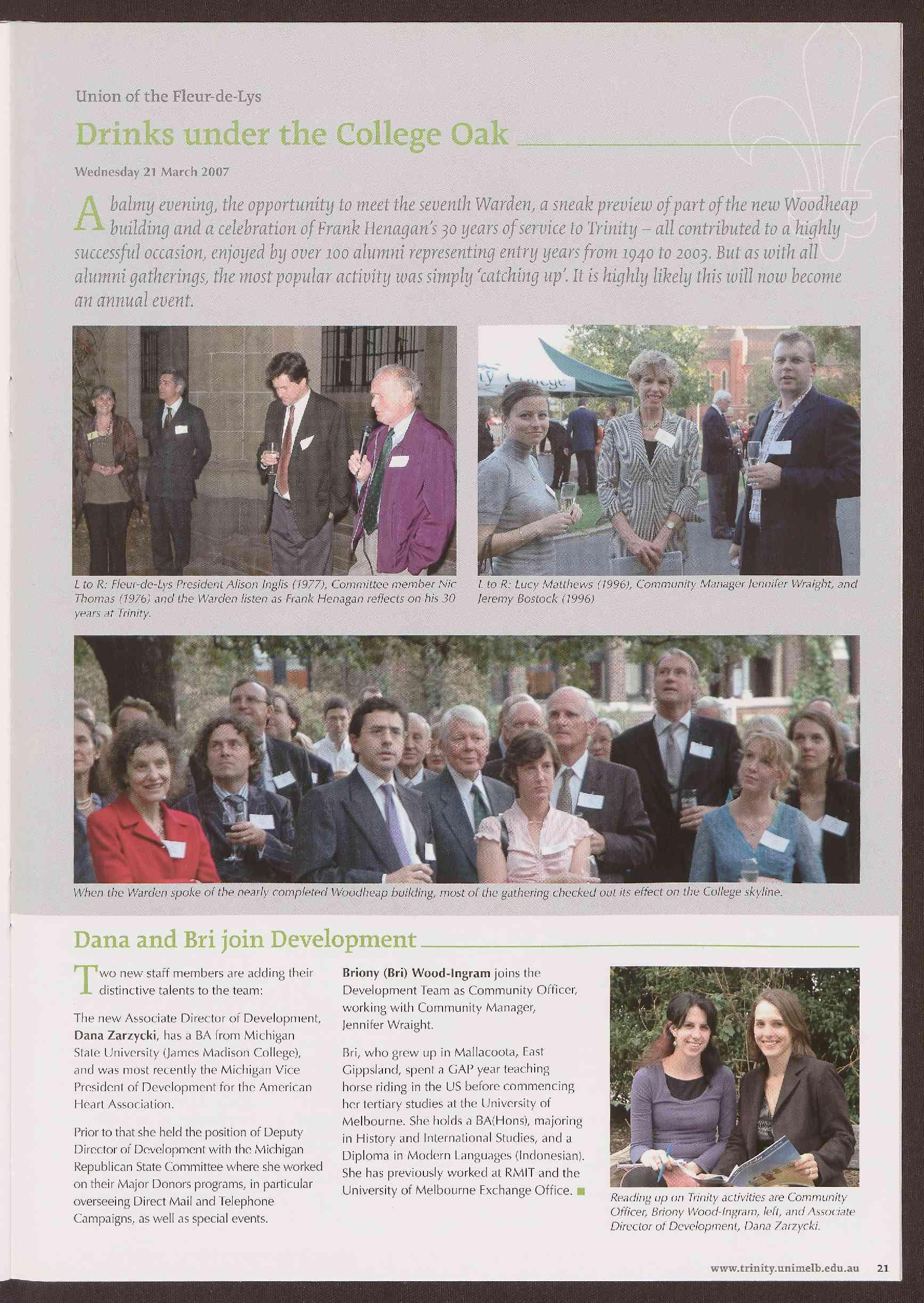
Wednesday 21 March 2007
balmy evening, the opportunity to meet the seventh Warden, a sneak preview of part of the new Woodheap building and a celebration of Frank Henagan's 3o ,years of service to Irrinity all contributed to a highly successful occasion, enjoyed by over too alumni representing entry years from 1940 to 2003. But as with all alumni gatherings, the most popular activity was simply 'catching up', It is highly likely this will now become an annual event.
When the Warden spoke of the nearly completed
Two new staff members are adding their distinctive talents to the team:
The new Associate Director of Development, Dana Zarzycki, has a BA from Michigan State University (James Madison College), and was most recently the Michigan Vice President of Development for the American Heart Association.
Prior to that she held the position of Deputy Director of Development with the Michigan Republican State Committee where she worked on their Major Donors programs, in particular overseeing Direct Mail and Telephone Campaigns, as well as special events.
Briony (Bri) Wood-Ingram joins the Development Team as Community Officer, working with Community Manager, Jennifer Wraight.
Bri, who grew up in Mallacoota, East Gippsland, spent a GAP year teaching horse riding in the US before commencing her tertiary studies at the University of Melbourne. She holds a BA(Hons), majoring in History and International Studies, and a Diploma in Modern Languages (Indonesian). She has previously worked at RMIT and the University of Melbourne Exchange Office. s Reading up on Trinity activities are Community Officer, Briony Wood-Ingram, left, and Associate Director of Development, Dana
you for your generous support during 2006
Anthony a'Beckett
Mick Adamson AM
Bruce Addis
All Souls' Opportunity Shop
Sandringham
Juliet Allen
Richard Allen
Stephen Alley
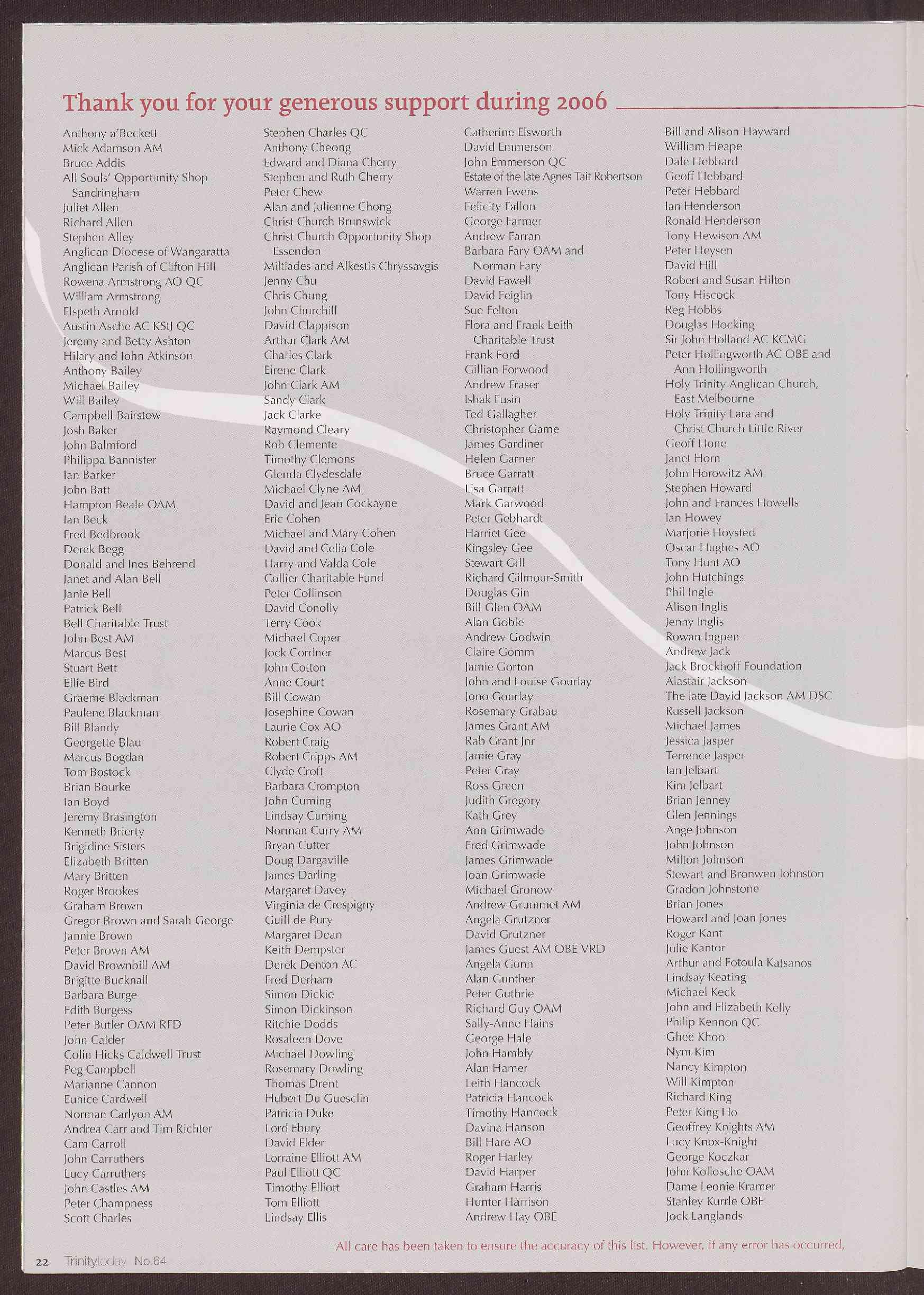
Stephen Charles QC
Anthony Cheong
Edward and Diana Cherry
Stephen and Ruth Cherry
Peter Chew
Alan and Julienne Chong
Christ Church Brunswick
Christ Church Opportunity Shop
Anglican Diocese of Wangaratta Essendon
Anglican Parish of Clifton Hill
Rowena Armstrong AO QC
William Armstrong
Elspeth Arnold
Austin Asche AC KStJ QC
Jeremy and Betty Ashton
Hilary and John Atkinson
Anthony Bailey
Michael Bailey
Will Bailey
Campbell Bairstow
Josh Baker
John Balmforcl
Philippa Bannister
Ian Barker
John Batt
Hampton Beale OAM
Ian Beck
Fred Bedbrook
Derek Begg
Donald and Ines Behrend
Janet and Alan Bell
Janie Bell
Patrick Bell
Bell Charitable Trust
John Best AM
Marcus Best
Stuart Bett
Ellie Bird
Graeme Blackman
Paulene Blackman
Bill Blancly
Georgette Blau
Marcus Bogdan
Tom Bostock
Brian Bourke
Ian Boyd
Jeremy Brasington
Kenneth Brierty
Brigidine Sisters
Elizabeth Britten
Mary Britten
Roger Brookes
Graham Brown
Gregor Brown and Sarah George
Jannie Brown
Peter Brown AM
David Brownbill AM
Brigitte Bucknall
Barbara Burge
Edith Burgess
Peter Butler OAM RFD
John Calder
Colin Hicks Caldwell Trust
Peg Campbell
Marianne Cannon
Eunice Cardwell
Norman Carlyon AM
Andrea Carr and Tim Richter
Cam Carroll
John Carruthers
Lucy Carruthers
John Castles AM
Peter Champness
Scott Charles
Miltiades and Alkestis Chryssavgis
Jenny Chu
Chris Chung
John Churchill
David Clappison
Arthur Clark AM
Charles Clark
Eirene Clark
John Clark AM
Sandy Clark
Jack Clarke
Raymond Cleary
Rob Clemente
Timothy Clemons
Glenda Clydesdale
Michael Clyne AM
David and Jean Cockayne
Eric Cohen
Michael and Mary Cohen
David and Celia Cole
Harry and Valda Cole
Collier Charitable Fund
Peter Collinson
David Conolly
Terry Cook
Michael Coper
Jock Corclner
John Cotton
Anne Court
Bill Cowan
Josephine Cowan
Laurie Cox AO
Robert Craig
Robert Cripps AM
Clyde Croft
Barbara Crompton
John Cuming
Lindsay Cuming
Norman Curry AM
Bryan Cutter
Doug Dargaville
James Darling
Margaret Davey
Virginia de Crespigny
Guill de Pury
Margaret Dean
Keith Dempster
Derek Denton AC
Fred Derham
Simon Dickie
Simon Dickinson
Ritchie Dodds
Rosaleen Dove
Michael Dowling
Rosemary Dowling
Thomas Drent
Hubert Du Guesclin
Patricia Duke
Lord Ebury
David Elder
Lorraine Elliott AM
Paul Elliott QC
Timothy Elliott
Tom Elliott
Lindsay Ellis
Catherine Elsworth
David Emmerson
John Emmerson QC
Estate of the late Agnes Tait
Warren Ewens
Felicity Fallon
George Farmer
Andrew Farran
Bill and Alison Hayward
William Heape
Dale Hebbard
Geoff Hebbard
Robertson
Peter Hebbard
Ian Henderson
Ronald Henderson
Tony Hewison AM
Barbara Fary OAM and Peter Heysen
David Hill
Norman Fary
David Fawell
David Feiglin
Sue Felton
Flora and Frank Leith
Charitable Trust
Frank Ford
Gillian Forwood
Andrew Fraser
Ishak Fusin
Ted Gallagher
Christopher Game
James Gardiner
Helen Garner
Bruce Garratt
Lisa Garratt
Mark Garwood
Peter Gebhardt
Harriet Gee
Kingsley Gee
Stewart Gill
Richard Gilmour-Smith
Douglas Gin
Bill Glen OAM
Alan Goble
Andrew Godwin
Claire Gomm
Jamie Gorton
John and Louise Gourlay
Jono Gourlay
Rosemary Grabau
James Grant AM
Rab Grant Jnr
Jamie Gray
Peter Gray
Ross Green
Judith Gregory
Kath Grey
Ann Grimwade
Fred Grimwade
James Grimwade
Joan Grimwade
Michael Gronow
Andrew Grummet AM
Angela Grutzner
David Grutzner
James Guest AM OBE VRD
Angela Gunn
Alan Gunther
Peter Guthrie
Richard Guy OAM
Sally-Anne Hains
George Hale
John Hambly
Alan Hamer
Leith Hancock
Patricia Hancock
Timothy Hancock
Davina Hanson
Bill Hare AO
Roger Harley
David Harper
Graham Harris
Hunter Harrison
Andrew Hay OBE
Robert and Susan Hilton
Tony Hiscock
Reg Hobbs
Douglas Hocking
Sir John Holland AC KCMG
Peter Hollingworth AC OBE and
Ann Hollingworth
Holy Trinity Anglican Church,
East Melbourne
Holy Trinity Lara and
Christ Church Little River
Geoff Hone
Janet Horn
John Horowitz AM
Stephen Howard
John and Frances Howells
Ian Howey
Marjorie Hoysted
Oscar Hughes AO
Tony Hunt AO
John Hutchings
Phil Ingle
Alison Inglis
Jenny Inglis
Rowan Ingpen
Andrew Jack
Jack Brockhoff Foundation
Alastair Jackson
The late David Jackson AM DSC
Russell Jackson
Michael James
Jessica Jasper
Terrence Jasper
Ian Jelbart
Kim Jelbart
Brian Jenney
Glen Jennings
Ange Johnson
John Johnson
Milton Johnson
Stewart and Bronwen Johnston
Gradon Johnstone
Brian Jones
Howard and Joan Jones
Roger Kant
Julie Kantor
Arthur and Fotoula Katsanos
Lindsay Keating
Michael Keck
John and Elizabeth Kelly
Philip Kennon QC
Ghee Khoo
Nym Kim
Nancy Kimpton
Will Kimpton
Richard King
Peter King Ho
Geoffrey Knights AM
Lucy Knox-Knight
George Koczkar
John Kollosche OAM
Dame Leonie Kramer
Stanley Kurrle OBE
Jock Langlands
Ross Lanyon
Richard Larkins AO
William and Claudia Lee
John Lester
Joy Letts
Mick Letts
Richard Levine
Robert Lewis AM
Tamar Lewit
Beng Lim
Libby Litchfield
John and Sue Liversidge
Brian Loton AC
Peter Lowenstern
George Lucas OAM
Rebecca Lucas
Russell Luckock
Rod Lyle
Rosemary Macindoe
Bruce Macintosh
Leigh Mackay
Margaret Mackie
Donald Mackinnon
Pat Main
Peter Manger
Ian Manning
Anthony Marks
Donald Markwell
Leigh Masel
Ken Mason AM
Andrew Maughan
Ian McCracken
Richard McDonald
Dugald McDougall
Andrew McGowan
Edwina McLachlan
Gilbert McLean
Kemeys McLean
Kay McLennan
Peter McMahon
Peter McPhee
Melbourne Community Foundation
Melbourne Grammar School
Graham Menzies
James Merralls AM QC
Roger Meyer
John Middleton QC
Hubert Miller OAM
Frank Milne MBE
The late George Mitchell
Peter Mitchell AM
Adrian Monger
John Monotti
Monty Moore
Hugh Morgan AC
Clive Morris
John Morris AO MBE
Marie Morton
Ronald Morton
Philip Moss
Stan and Betty Moss
Peter Muirhead
Michael Munckton
Bruce Munro
Ian Munro
Bill Muntz
James Murray
David Muschamp
Martyn Myer
Rupert Myer
Martin and Vicky Nakata
Heather Neilson
John and Janet Nelson
Mary Newman
please accept
Joyce Newton OAM
Stephen Newton
Bob Nicholls
Philip Nicholls
Dani Nichols
Jessie Nicholson
Paul Nisselle AM
Julia Nutting
Helen O'Brien
John Oliver
Richard Oppenheim
Colleen O'Reilly
Deirdre Osborne
Glenda Owen
Ken Parker
Geoffrey Parkin
Bruce Parncutt and
Robin Campbell
Alison Payne
Penelope Pengilley
James Perry
John Pettit
Patricia Phair
Simon Phillipson
Pierce Armstrong Foundation
Geoffrey Pitcher
Peter Pockley
Harry Pope
David Porter
Bill Potter
Dick Potter
John Poynter AO OBE
Andrew Prentice
Clare Pullar
Imogen Pullar
Barrie Purvis
Peg Randell
Keith Rayner AO
Alec Reid
Ian and Julie Reid
Gregory Reinhardt
Peter Rennie
Margaret Rice
Alan Richards
Ronald Richards
Harold Riggall
Roger Riordan AM
John Roberts
Bob Robertson
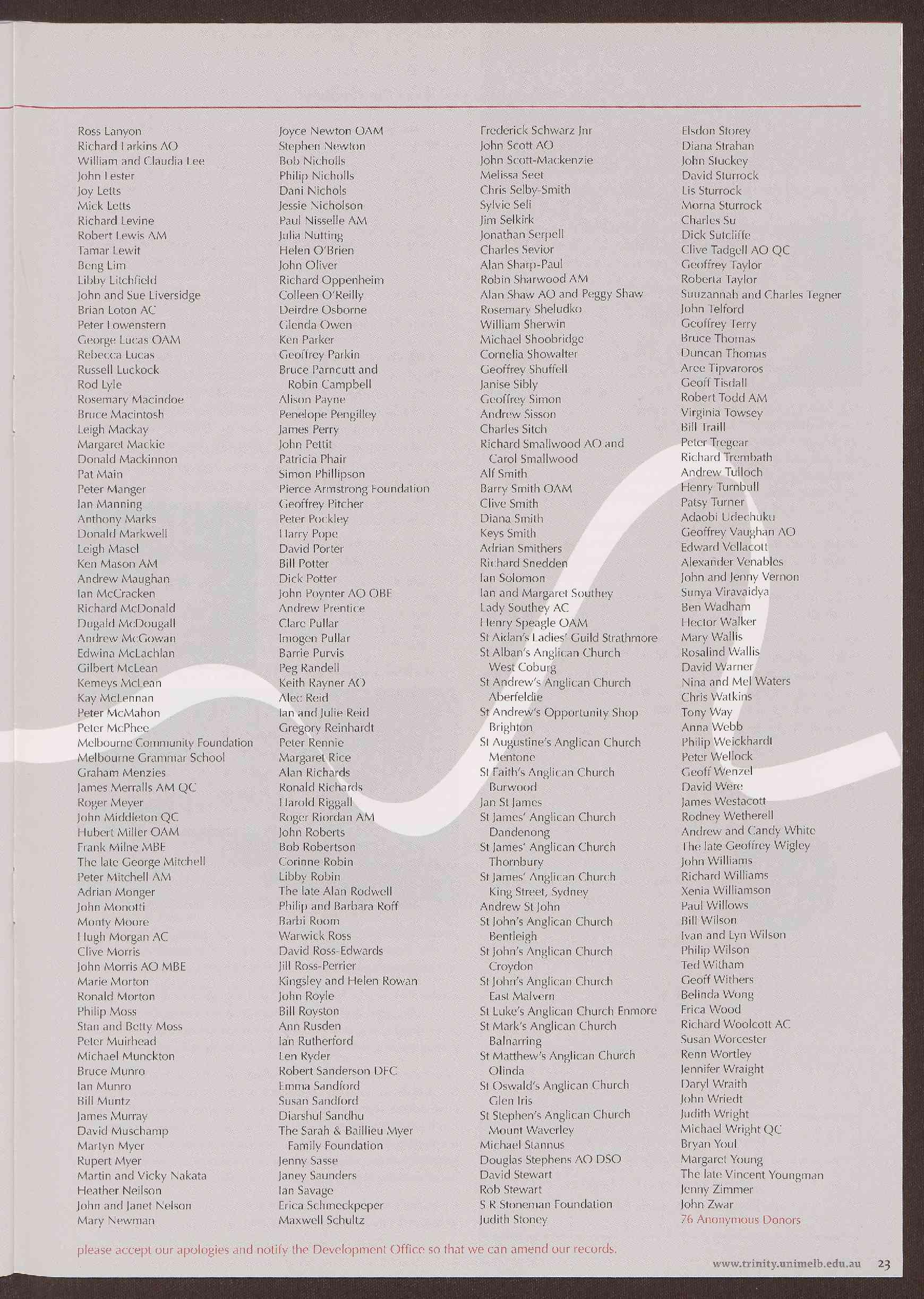
Frederick Schwarz Jnr
John Scott AO
John Scott-Mackenzie
Melissa Seet
Chris Selby-Smith
Sylvie Seli
Jim Selkirk
Jonathan Serpell
Charles Sevior
Alan Sharp-Paul
Robin Sharwood AM
Alan Shaw AO and Peggy Shaw
Rosemary Sheludko
William Sherwin
Michael Shoobridge
Cornelia Showalter
Geoffrey Shuffell
Janise Sibly
Geoffrey Simon
Andrew Sisson
Charles Sitch
Elsdon Storey
Diana Strahan
John Stuckey
David Sturrock
Lis Sturrock
Morna Sturrock
Charles Su
Dick Sutcliffe
Clive Tadgell AO QC
Geoffrey Taylor
Roberta Taylor
Suuzannah and Charles Tegner
John Telford
Geoffrey Terry
Bruce Thomas
Duncan Thomas
Aree Tipvaroros
Geoff Tisdall
Robert Todd AM
Virginia Towsey
Bill Trail!
Richard Smallwood AO and Peter Tregear
Carol Smallwood
Alf Smith
Barry Smith OAM
Clive Smith
Diana Smith
Keys Smith
Adrian Smithers
Richard Snedden
Ian Solomon
Richard Trembath
Andrew Tulloch
Henry Turnbull
Patsy Turner
Adaobi Udechuku
Geoffrey Vaughan AO
Edward Vellacott
Alexander Venables
John and Jenny Vernon
Ian and Margaret Southey Sunya Viravaidya
Ben Wadham
Lady Southey AC
Henry Speagle OAM
St Aidan's Ladies' Guild Strathmore
St Alban's Anglican Church
West Coburg
St Andrew's Anglican Church
Aberfeldie
St Andrew's Opportunity Shop
Brighton
St Augustine's Anglican Church
Mentone
St Faith's Anglican Church
Burwood
Jan St James
St James' Anglican Church
Dandenong
St James' Anglican Church
Corinne Robin Thornbury
Libby Robin
The late Alan Roclwell
Philip and Barbara Roff
Barbi Room
Warwick Ross
David Ross-Edwards
Jill Ross-Perrier
Kingsley and Helen Rowan
John Royle
Bill Royston
Ann Rusden
Ian Rutherford
Len Ryder
Robert Sanderson DFC
Emma Sandford
Susan Sandford
Diarshul Sandhu
The Sarah & Baillieu Myer
Family Foundation
Jenny Sasse
Janey Saunders
Ian Savage
Erica Schmeckpeper
Maxwell Schultz
St James' Anglican Church
King Street, Sydney
Andrew St John
St John's Anglican Church
Bentleigh
St John's Anglican Church
Croydon
St John's Anglican Church
East Malvern
St Luke's Anglican Church Elmore
St Mark's Anglican Church
Balnarring
Hector Walker
Mary Wallis
Rosalind Wallis
David Warner
Nina and Mel Waters
Chris Watkins
Tony Way
Anna Webb
Philip Weickhardt
Peter Wellock
Geoff Wenzel
David Were
James Westacott
Rodney Wetherell
Andrew and Candy White
The late Geoffrey Wigley
John Williams
Richard Williams
Xenia Williamson
Paul Willows
Bill Wilson
Ivan and Lyn Wilson
Philip Wilson
Ted Witham
Geoff Withers
Belinda Wong
Erica Wood
Richard Woolcott AC
Susan Worcester
St Matthew's Anglican Church Renn Wortley
Olinda
St Oswald's Anglican Church
Glen Iris
St Stephen's Anglican Church
Mount Waverley
Michael Stannus
Douglas Stephens AO DSC)
David Stewart
Rob Stewart
S R Stoneman Foundation
Judith Stoney
Jennifer Wraight
Daryl Wraith
John Wriedt
Judith Wright
Michael Wright QC
Bryan Youl
Margaret Young
The late Vincent Youngman
Jenny Zimmer
John Zwar
76 Anonymous Donors
Interview by Harrison Wraight (2' year Architecture)
not otherwise be able to afford.
'Trinity has been my main objective in terms of tertiary assistance,' Clive explains.
Having been a resident student at Trinity College in the fifties, Clive reflects that his first year in Trinity was 'fantastic, and certainly set a pattern for the rest of my life'.
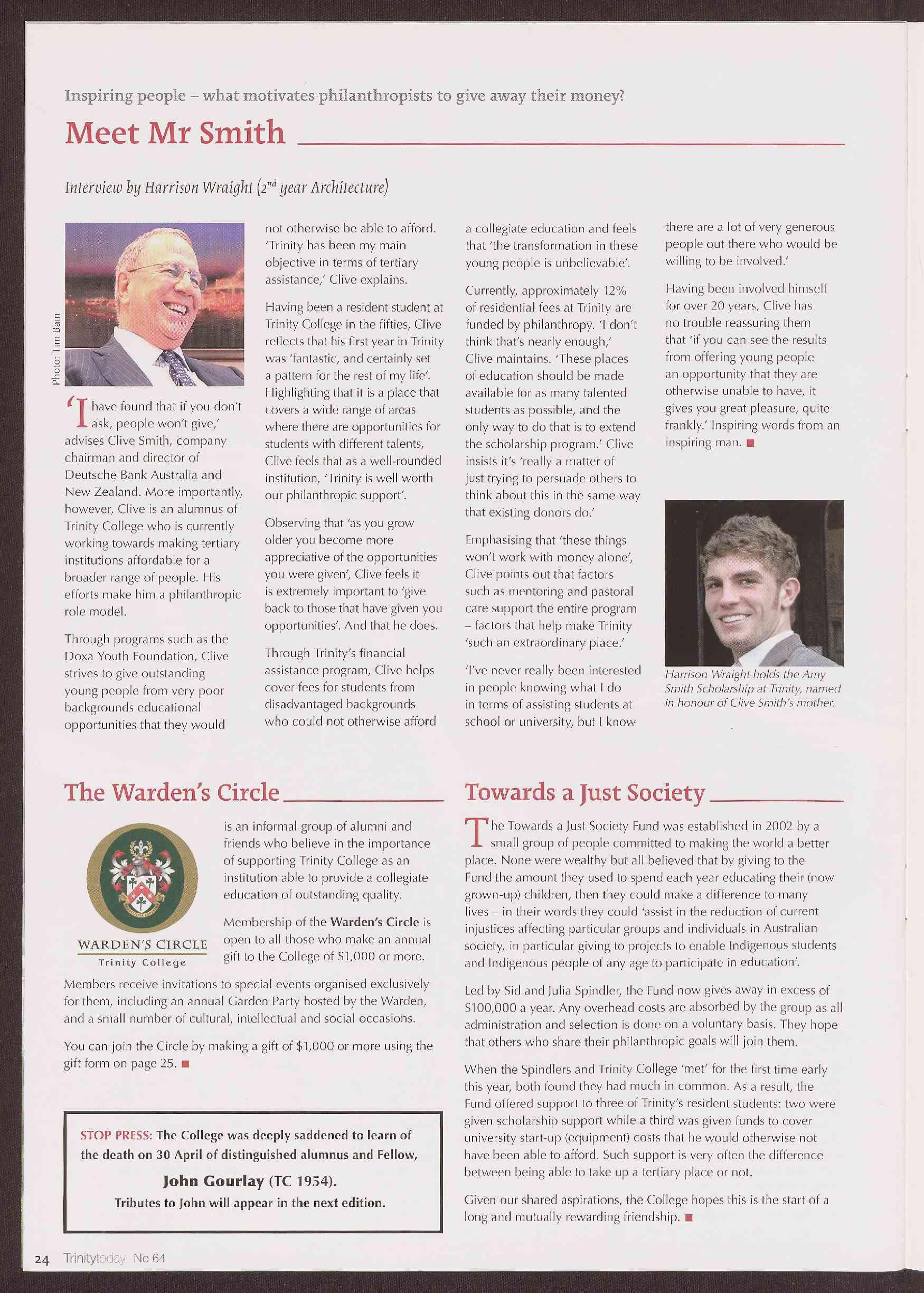
IT have found that if you don't 1 ask, people won't give,' advises Clive Smith, company chairman and director of Deutsche Bank Australia and New Zealand. More importantly, however, Clive is an alumnus of Trinity College who is currently working towards making tertiary institutions affordable for a broader range of people. His efforts make him a philanthropic role model.
Through programs such as the Doxa Youth Foundation, Clive strives to give outstanding young people from very poor backgrounds educational opportunities that they would
Highlighting that it is a place that covers a wide range of areas where there are opportunities for students with different talents, Clive feels that as a well-rounded institution, 'Trinity is well worth our philanthropic support'.
Observing that 'as you grow older you become more appreciative of the opportunities you were given', Clive feels it is extremely important to 'give back to those that have given you opportunities'. And that he does.
Through Trinity's financial assistance program, Clive helps cover fees for students from disadvantaged backgrounds who could not otherwise afford
is an informal group of alumni and friends who believe in the importance of supporting Trinity College as an institution able to provide a collegiate education of outstanding quality.
Membership of the Warden's Circle is WARDEN'S CIRCLE open to all those who make an annual Trinity College gift to the College of $1,000 or more.
Members receive invitations to special events organised exclusively for them, including an annual Garden Party hosted by the Warden, and a small number of cultural, intellectual and social occasions.
You can join the Circle by making a gift of $1,000 or more using the gift form on page 25. ■
STOP PRESS: The College was deeply saddened to learn of the death on 30 April of distinguished alumnus and Fellow, John Gourlay (TC 1954).
Tributes to John will appear in the next edition.
a collegiate education and feels that 'the transformation in these young people is unbelievable'.
Currently, approximately 12% of residential fees at Trinity are funded by philanthropy. 'I don't think that's nearly enough,' Clive maintains. 'These places of education should be made available for as many talented students as possible, and the only way to do that is to extend the scholarship program.' Clive insists it's 'really a matter of just trying to persuade others to think about this in the same way that existing donors do.'
Emphasising that 'these things won't work with money alone', Clive points out that factors such as mentoring and pastoral care support the entire program — factors that help make Trinity 'such an extraordinary place.'
'I've never really been interested in people knowing what I do in terms of assisting students at school or university, but I know
there are a lot of very generous people out there who would be willing to be involved.'
Having been involved himself for over 20 years, Clive has no trouble reassuring them that 'if you can see the results from offering young people an opportunity that they are otherwise unable to have, it gives you great pleasure, quite frankly.' Inspiring words from an inspiring man. ■
The Towards a Just Society Fund was established in 2002 by a small group of people committed to making the world a better place. None were wealthy but all believed that by giving to the Fund the amount they used to spend each year educating their (now grown-up) children, then they could make a difference to many lives — in their words they could 'assist in the reduction of current injustices affecting particular groups and individuals in Australian society, in particular giving to projects to enable Indigenous students and Indigenous people of any age to participate in education'.
Led by Sid and Julia Spindler, the Fund now gives away in excess of $100,000 a year. Any overhead costs are absorbed by the group as all administration and selection is done on a voluntary basis. They hope that others who share their philanthropic goals will join them.
When the Spindlers and Trinity College 'met' for the first time early this year, both found they had much in common. As a result, the Fund offered support to three of Trinity's resident students: two were given scholarship support while a third was given funds to cover university start-up (equipment) costs that he would otherwise not have been able to afford. Such support is very often the difference between being able to take up a tertiary place or not.
Given our shared aspirations, the College hopes this is the start of a long and mutually rewarding friendship. ■
Recently I was thinking back to my days spent at Trinity College. At the time when my father so kindly offered to pay for my tuition I did not quite appreciate what that really meant. It was not until later that I looked back and realised how I benefited from those four years at Trinity. I enjoyed the College camaraderie and the opportunity to meet new people from different backgrounds. My experience at Trinity has contributed to my life since and I have a wonderful appreciation of the benefits of being associated with the College.
Because of my relationship with Trinity, I agreed with much enthusiasm when I was asked to become involved in the first Annual Giving Campaign. It was the first time the College had attempted such a campaign and it proved to be a huge project to launch. Now I am pleased to say that the campaign has been most successful and last year the Annual Giving Fund exceeded $314,000. I am confident this success will continue.
Our aim now is to increase the number of alumni participating in Annual Giving. Whilst we have achieved much in terms of establishing a successful campaign, a lot of effort is still required to increase the alumni participation rate. Refocusing the Annual Giving Campaign and bringing it to the next level is something I believe requires new leadership and I will shortly retire.
The Annual Giving Campaign is a key to the College's pursuit of excellence and I am confident that under the guidance of a new Chair it will continue to build upon its past success. Thank you to all who have participated in the Annual Giving Campaigns and I strongly encourage everyone to donate to this year's Campaign. •
I'd like to support Trinity College this year
Your annual gift to Trinity College matters...
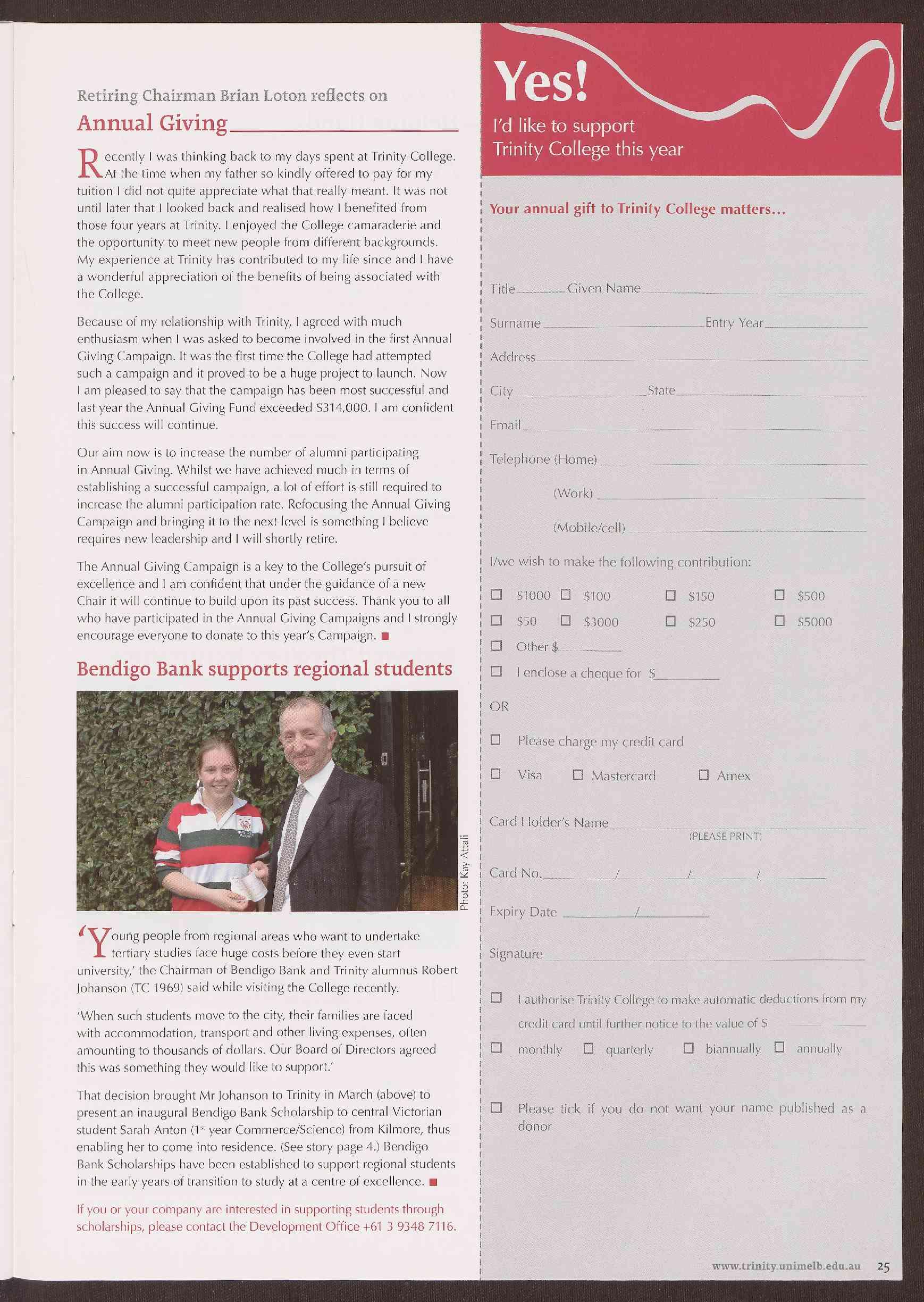
Title Given Name Surname Entry Year
Address
City____ State
Telephone (Home) (Work)
(Mobile/cell)
I/we wish to make the following contribution:
Other $
❑ I enclose a cheque for $
❑ Please charge my credit card
D Visa ❑ Mastercard ❑ Amex
Card Holder's Name (PLEASE PRINT)
Card No.
Expiry Date
Y‘oung people from regional areas who want to undertake
tertiary studies face huge costs before they even start university,' the Chairman of Bendigo Bank and Trinity alumnus Robert Johanson (TC 1969) said while visiting the College recently.
'When such students move to the city, their families are faced with accommodation, transport and other living expenses, often amounting to thousands of dollars. Our Board of Directors agreed this was something they would like to support.'
That decision brought Mr Johanson to Trinity in March (above) to present an inaugural Bendigo Bank Scholarship to central Victorian student Sarah Anton (1'' year Commerce/Science) from Kilmore, thus enabling her to come into residence. (See story page 4.) Bendigo Bank Scholarships have been established to support regional students in the early years of transition to study at a centre of excellence. •
If you or your company are interested in supporting students through scholarships, please contact the Development Office +61 3 9348 7116.
Signature
❑ I authorise Trinity College to make automatic deductions from my credit card until further notice to the value of $
❑ Please tick if you do not want your name published as a donor
I'd like to support Trinity College this year
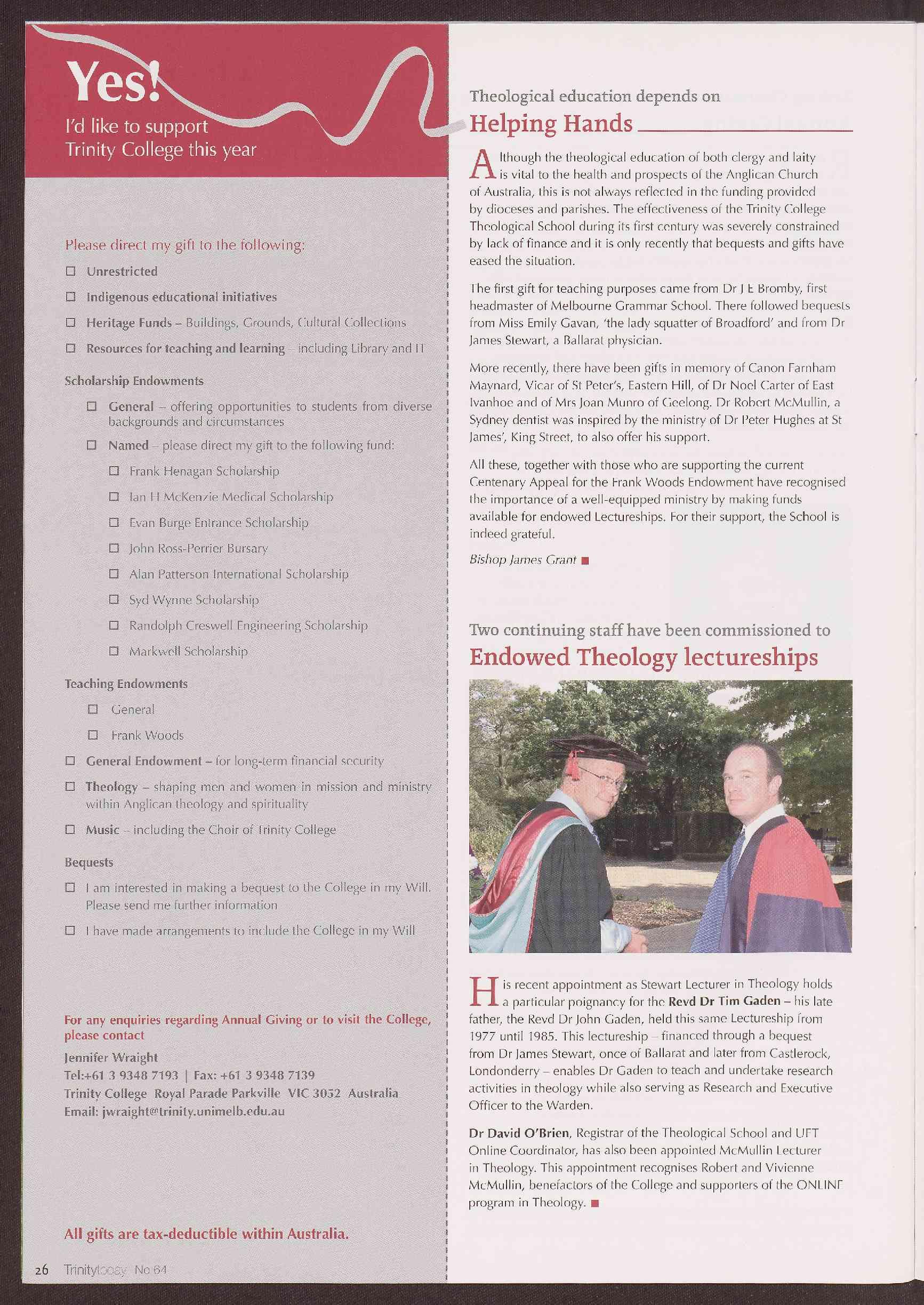
Please direct my gift to the following:
❑ Unrestricted
❑ Indigenous educational initiatives
❑ Heritage Funds - Buildings, Grounds, Cultural Collections
❑ Resources for teaching and learning - including Library and IT
Scholarship Endowments
❑ General - offering opportunities to students from diverse backgrounds and circumstances
❑ Named - please direct my gift to the following fund:
❑ Frank Henagan Scholarship
❑ an H McKenzie Medical Scholarship
❑ Evan Burge Entrance Scholarship
❑ John Ross-Perrier Bursary
❑ Alan Patterson International Scholarship
❑ Syd Wynne Scholarship
❑ Randolph Creswell Engineering Scholarship
❑ Markwell Scholarship
Teaching Endowments
❑ General
❑ Frank Woods
❑ General Endowment - for long-term financial security
❑ Theology - shaping men and women in mission within Anglican theology and spirituality
ind ministry
Theological education depends on
Although the theological education of both clergy and laity is vital to the health and prospects of the Anglican Church of Australia, this is not always reflected in the funding provided by dioceses and parishes. The effectiveness of the Trinity College Theological School during its first century was severely constrained by lack of finance and it is only recently that bequests and gifts have eased the situation.
The first gift for teaching purposes came from Dr J E Bromby, first headmaster of Melbourne Grammar School. There followed bequests from Miss Emily Gavan, the lady squatter of Broadford' and from Dr James Stewart, a Ballarat physician.
More recently, there have been gifts in memory of Canon Farnham Maynard, Vicar of St Peter's, Eastern Hill, of Dr Noel Carter of East Ivanhoe and of Mrs Joan Munro of Geelong. Dr Robert McMullin, a Sydney dentist was inspired by the ministry of Dr Peter Hughes at St James', King Street, to also offer his support.
All these, together with those who are supporting the current Centenary Appeal for the Frank Woods Endowment have recognised the importance of a well-equipped ministry by making funds available for endowed Lectureships. For their support, the School is indeed grateful.
Bishop lames Grant ■
❑! Music including the Choir of Trinity College
Bequests
❑ I am interested in making a bequest to the College in my Will. Please send me further information
❑ I have made arrangements to include the College in my Will
HFor any enquiries regarding Annual Giving or to visit the College, please contact
Jennifer Wraight
Tel:+61 3 9348 7193 Fax: +61 3 9348 7139
Trinity College Royal Parade Parkville VIC 3052 Australia
Email: jwraightt°trinity.unimelb.edu.au
is recent appointment as Stewart Lecturer in Theology holds a particular poignancy for the Revd Dr Tim Gaden - his late father, the Revd Dr John Gaden, held this same Lectureship from 1977 until 1985. This lectureship - financed through a bequest from Dr James Stewart, once of Ballarat and later from Castlerock, Londonderry - enables Dr Gaden to teach and undertake research activities in theology while also serving as Research and Executive Officer to the Warden.
Dr David O'Brien, Registrar of the Theological School and UFT Online Coordinator, has also been appointed McMullin Lecturer in Theology. This appointment recognises Robert and Vivienne McMullin, benefactors of the College and supporters of the ONLINE program in Theology. ■
All gifts are tax-deductible within Australia.
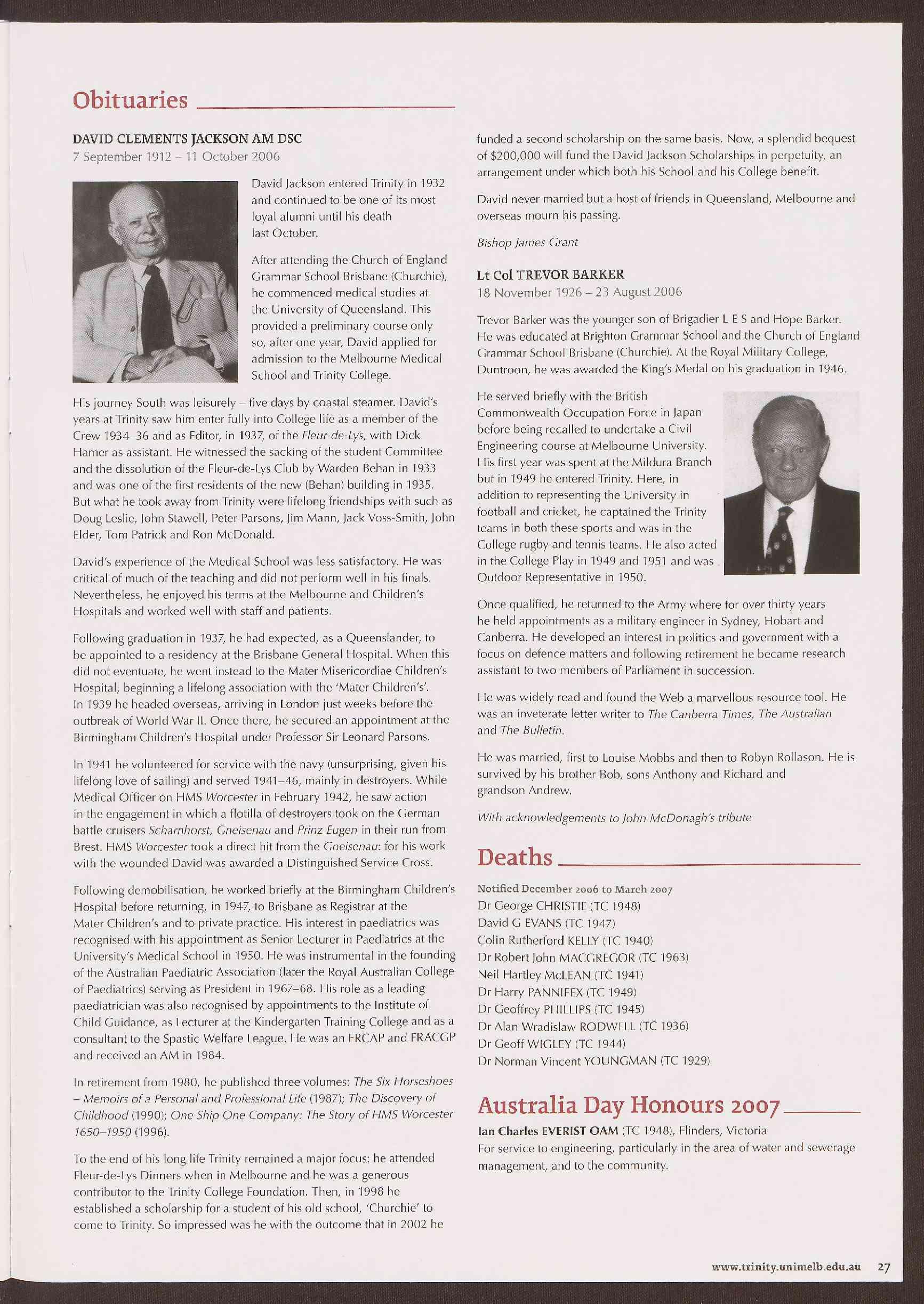
DAVID CLEMENTS JACKSON AM DSC
7 September 1912 — 11 October 2006
David Jackson entered Trinity in 1932 and continued to be one of its most loyal alumni until his death last October.
After attending the Church of England Grammar School Brisbane (Churchie), he commenced medical studies at the University of Queensland. This provided a preliminary course only so, after one year, David applied for admission to the Melbourne Medical School and Trinity College.
His journey South was leisurely — five days by coastal steamer. David's years at Trinity saw him enter fully into College life as a member of the Crew 1934-36 and as Editor, in 1937, of the Fleur-de-Lys, with Dick Hamer as assistant. He witnessed the sacking of the student Committee and the dissolution of the Fleur-de-Lys Club by Warden Behan in 1933 and was one of the first residents of the new (Behan) building in 1935. But what he took away from Trinity were lifelong friendships with such as Doug Leslie, John Stawell, Peter Parsons, Jim Mann, Jack Voss-Smith, John Elder, Tom Patrick and Ron McDonald.
David's experience of the Medical School was less satisfactory. He was critical of much of the teaching and did not perform well in his finals. Nevertheless, he enjoyed his terms at the Melbourne and Children's Hospitals and worked well with staff and patients.
Following graduation in 1937, he had expected, as a Queenslander, to be appointed to a residency at the Brisbane General Hospital. When this did not eventuate, he went instead to the Mater Misericordiae Children's Hospital, beginning a lifelong association with the 'Mater Children's'. In 1939 he headed overseas, arriving in London just weeks before the outbreak of World War II. Once there, he secured an appointment at the Birmingham Children's Hospital under Professor Sir Leonard Parsons.
In 1941 he volunteered for service with the navy (unsurprising, given his lifelong love of sailing) and served 1941-46, mainly in destroyers. While Medical Officer on HMS Worcester in February 1942, he saw action in the engagement in which a flotilla of destroyers took on the German battle cruisers Scharnhorst, Gneisenau and Prinz Eugen in their run from Brest. HMS Worcester took a direct hit from the Gneisenau: for his work with the wounded David was awarded a Distinguished Service Cross.
Following demobilisation, he worked briefly at the Birmingham Children's Hospital before returning, in 1947, to Brisbane as Registrar at the Mater Children's and to private practice. His interest in paediatrics was recognised with his appointment as Senior Lecturer in Paediatrics at the University's Medical School in 1950. He was instrumental in the founding of the Australian Paediatric Association (later the Royal Australian College of Paediatrics) serving as President in 1967-68. His role as a leading paediatrician was also recognised by appointments to the Institute of Child Guidance, as Lecturer at the Kindergarten Training College and as a consultant to the Spastic Welfare League. He was an FRCAP and FRACGP and received an AM in 1984.
In retirement from 1980, he published three volumes: The Six Horseshoes — Memoirs of a Personal and Professional Life (1987); The Discovery of Childhood (1990); One Ship One Company: The Story of HMS Worcester 1650-1950 (1996).
To the end of his long life Trinity remained a major focus: he attended Fleur-de-Lys Dinners when in Melbourne and he was a generous contributor to the Trinity College Foundation. Then, in 1998 he established a scholarship for a student of his old school, 'Churchie' to come to Trinity. So impressed was he with the outcome that in 2002 he
funded a second scholarship on the same basis. Now, a splendid bequest of $200,000 will fund the David Jackson Scholarships in perpetuity, an arrangement under which both his School and his College benefit.
David never married but a host of friends in Queensland, Melbourne and overseas mourn his passing.
Bishop James Grant
Lt Col TREVOR BARKER
18 November 1926 — 23 August 2006
Trevor Barker was the younger son of Brigadier L E S and Hope Barker. He was educated at Brighton Grammar School and the Church of England Grammar School Brisbane (Churchie). At the Royal Military College, Duntroon, he was awarded the King's Medal on his graduation in 1946.
He served briefly with the British Commonwealth Occupation Force in Japan before being recalled to undertake a Civil Engineering course at Melbourne University.
His first year was spent at the Mildura Branch but in 1949 he entered Trinity. Here, in addition to representing the University in football and cricket, he captained the Trinity teams in both these sports and was in the College rugby and tennis teams. He also acted in the College Play in 1949 and 1951 and was Outdoor Representative in 1950.
Once qualified, he returned to the Army where for over thirty years he held appointments as a military engineer in Sydney, Hobart and Canberra. He developed an interest in politics and government with a focus on defence matters and following retirement he became research assistant to two members of Parliament in succession.
He was widely read and found the Web a marvellous resource tool. He was an inveterate letter writer to The Canberra Times, The Australian and The Bulletin.
He was married, first to Louise Mobbs and then to Robyn Rollason. He is survived by his brother Bob, sons Anthony and Richard and grandson Andrew.
With acknowledgements to John McDonagh's tribute
Notified December 2oo6 to March 2007
Dr George CHRISTIE (TC 1948)
David G EVANS (TC 1947)
Colin Rutherford KELLY (TC 1940)
Dr Robert John MACGREGOR (TC 1963)
Neil Hartley McLEAN (TC 1941)
Dr Harry PANNIFEX (TC 1949)
Dr Geoffrey PHILLIPS (TC 1945)
Dr Alan Wradislaw RODWELL (TC 1936)
Dr Geoff WIGLEY (TC 1944)
Dr Norman Vincent YOUNGMAN (TC 1929)
Ian Charles EVERIST OAM (TC 1948), Flinders, Victoria
For service to engineering, particularly in the area of water and sewerage management, and to the community.
Latest details of these and all coming events at www.trinity.unimelb.edu.au/news/events
ulv 1-16
The 7th Warden & President, Dr Andrew McGowan, and other senior staff will host a number of alumni events and receptions for TCFS parents in Malaysia (1-7 July) and Singapore (8 —16 July). To receive an invitation to these events please register your interest online.
This visit coincides with the first tour to Asia by the internationally acclaimed Choir of Trinity College, performing in Kuala Lumpur, Penang, Kota Kinabalu and Singapore. As details are finalised they will be available online 41( www.trinity.unimelb.edu.au/alumni/events/asia
Saturday 19 May at 5.30pm
Haydn Paukenmesse (Kettledrum Mass) with the Choir and Chamber Orchestra in the Trinity College Dining Hall
Sunday 27 May at 2pm
Recital by John Wion (TC 1955), flute, and Stephen McIntyre, piano, in the Trinity College Chapel
Saturday 13 October at Port Fairy Festival & Saturday 20 October at 5.30pm in Trinity College Dining Hall
The Choir sings Brahms Ein deutsches Requiem (A German Requiem)

'Golden Oldies' 50 Year Reunion (for 1957 entry year) at the College
Saturday 11 Au ust at 7 for 7 30
Union of the Fleur-de-Lys 135th Anniversary Dinner at the National Gallery of Victoria (International)
13 1 20 1 27 May at 4.30 pm
nnv r 'and`., h arï a'in't`'e úrliór iŸïon 'o"""' (see page°"1i' u`: ernoo ârriwü
9 111 1 16 1 18 1 23 1 25 1 30 Ma and 1)une
Classes in Yolgnu Matha taught by RJrriwuy Ma
Seminars & Conferences
Monday 21 May at 6.30pm
'Life in the Near East and C ral Asia during the Arah invasions' with Abby Robinson in the Sh,irwood Room nd Theological Lilyrorv Associafion Limited (AN1TLA) Conlerence reasures Old New'
fiu' s ây'1
Sunday 23 — Monday 24September ..y`posiuni n Phi antirohÿ anti f e Human î eéynote speaker Mr Peter GolcJmarl., I .cPor of the Climate and Air Program for Environmental Defence, New York.